
The German Resume
Apply for a job in Germany with your winning German resume

Certified Professional Resume Writer
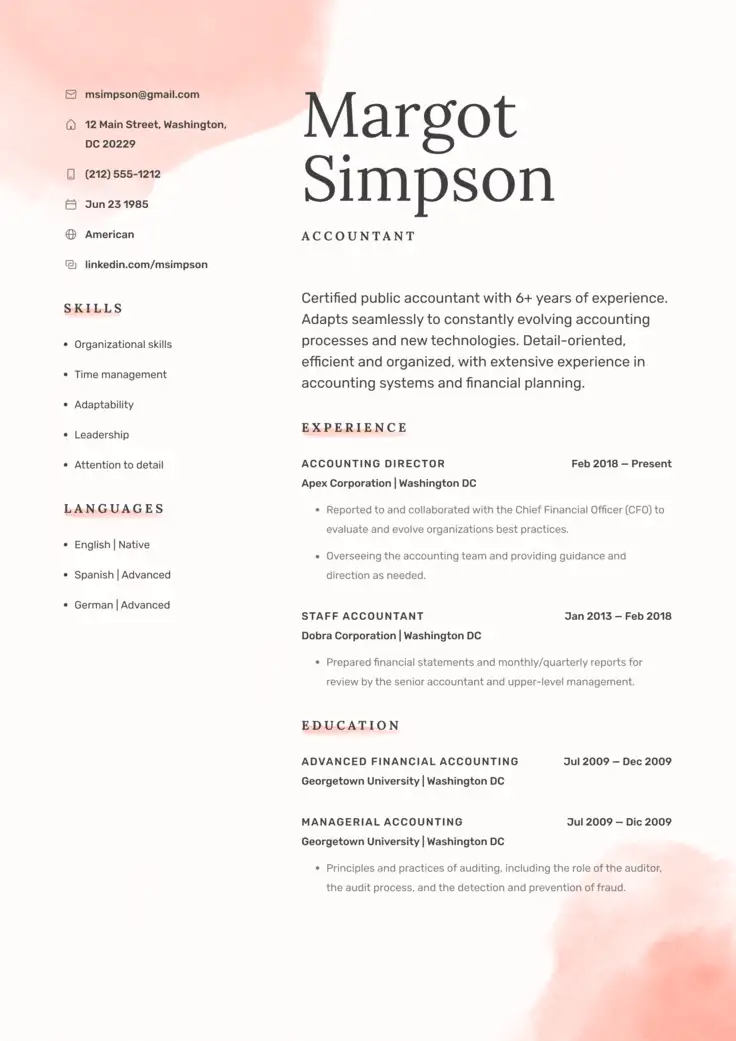
If you’re interested in working in a German-speaking environment you will need to know how to present a German job application and what that includes. Even though resumes may be an international idea, there are still many differences from country to country when it comes to writing a resume to suit the recruiting environment for each culture.
A resume is the first impression you will make on a prospective employer and if you need to present a resume in German , you will need to take into consideration various factors such as cultural preferences and professional standards. What a German recruiter expects to see in a job application is not the same as what an American recruiter expects.
The name for the German resume , or CV as it is more widely known in Europe, is the Lebenslauf. In the world of recruiting in Germany, Austria, Switzerland , and other German-speaking regions, the Lebenslauf is regarded as less of a marketing product and more of a factual document . This means that instead of including lots of professional or academic achievements and details about responsibilities undertaken in previous positions, the resume itself will simply list details that are of interest to German employers . Maintaining this format will allow the jobseeker to get their candidacy into the next recruitment stage – the interview.
The following guide will answer the questions: what is a Lebenslauf ? and show you how to write a German resume that will fit the recruitment standards for German-speaking companies.
Writing a Resume in German
Knowing how to write a resume in German is vital if you’re planning on either moving to a German-speaking country or aim to work within the German market.
A simple translation of your current resume will not be enough to produce a successful job application and you should always be mindful of literal translations in German because the language has many rules and tricks that make it difficult to fully grasp.
If you already have a good level of German you will be able to make a decent go of writing a German resume or Lebenslauf with some professional guidance . If, however, you do not yet dominate the language, you could find yourself with some serious issues when it comes to writing your German resume from scratch. One way to avoid these problems is to use an online German resume builder that allows you to use German resume templates that are pre-constructed and approved by specialist German recruiters.
Whether you decide to write your German resume using examples of Lebenslauf or not, the following tips will help you to optimize your personalized German resume.
- At the very beginning of your German resume, you will need to add a header which should include your name as the title . Never title a German resume with the word Lebenslauf itself.
- German recruiters prefer to receive resumes in a professional and executive manner, without a variety of different fonts and colors, etc. This means candidates should stick to traditional resume styles instead of the emerging creative resume layouts which can be popular elsewhere.
- It is essential that jobseekers do their research before applying for a job with a German company . In order to fully tailor your German resume to a specific vacancy, you must investigate the company culture, rules and regulations, hiring processes and generally have a good background knowledge of what the company is looking for in the suitable candidate.
- As has been mentioned, German resumes are simply factual documents that do not require candidates to embellish or decorate with superfluous information. It is essential that candidates stick to the facts and make no outrageous claims or include irrelevant details that are not directly related to the vacancy, sector or candidate’s professional profile.
- In German resumes it is extremely important to take special care with spelling and grammar . Mistakes of this kind are taken very seriously by German recruiters and a simple typo could cost you your chance at an interview for your dream job. Keep in mind that hiring managers in German-speaking countries are especially particular about well-written and linguistically perfect resumes.
Considering the nature and difficulty of the German language, even if you are practically fluent, it is a good idea to have someone review and proofread your German resume before sending off your application. In addition to using German resume templates and heeding expert advice on resume writing , your best bet at getting through to the next selection stage is to use your resources: friends, teachers, peers, managers, etc. to help you construct a winning German resume.
German Resume: Layout and Sections
To create a German resume with the right structure and style for German companies , there are some general rules to bear in mind. The German resume format differs slightly from a general resume format . The following tips will give candidates the information they need to lay out a German resume in the correct manner:
- The standard length of a German resume is 1-2 A4 pages . Candidates should not produce resumes that exceed this length because they will be discarded. It is more common to see a 1-page resume that 2 but it is acceptable to use 2 pages if all the information included is relevant to the job application.
- It is advisable to use only one standard font and size of text throughout the resume, with few changes for titles/subtitles. Applicants should also avoid using too much text formatting in the form of italic or bold lettering.
- The most common format for a German resume is to include a professional headshot at the top and to divide the existing sections into two columns , in order to place the dates that correspond to the activities or qualifications on the left and the details of the experience on the right.
For help with creating a German Lebenslauf , candidates can use German resume templates or online examples that show exactly how to write a German resume to make sure their candidacy stands out of the crowd.
What to Include in a German Resume
Knowing how to structure a German resume is not the only aspect that should be considered when you need to present a job application for a German company. There is also the content and sections to be included in a German resume.
The most common parts of a German resume are as follows:
Personal and contact details
Persönliches and Kontaktinformationen This section should include a professional photo in the top-left corner with the personal details, and candidate’s name as the title, either by the side of just below as part of the header for a German resume.
The contact details should consist of the following:
- Address – Adresse
- Phone number – Telefonnummer
- Email – Mail
- Website or professional online profile such as LinkedIn
The personal details are to add to the factual nature of the German resume and include certain data that would not usually be included on an American resume. This section should list:
- Date of birth of applicant, written simply as born – Geboren
- Nationality – Staatsangehörigkeit
- Marital status – Familienstand
Previously, it was also common practice to include the number and ages of children that an applicant had as part of this German resume section but it is becoming less and less popular as recruiting techniques change.
If you are uncomfortable adding any of this information or including a photo on your German Lebenslauf , you should be aware that it is not a legal requirement for a job application in Germany. Nevertheless, German recruiters will be expecting to have the information readily available so do be prepared to answer questions of the same kind at an interview.
Ausbildung This section can either be placed before or after the work experience section depending on the needs and profile of the candidate. For students or entry-level applicants, it is possible that a German resume with a strong academic history in the initial part of the document will have a more positive impact on a hiring manager than one with a bare job history as the starting point.
The courses and certificates included in this part should be written in reverse-chronological order . That is to say, beginning with the most recent and relevant certification and working backward.
Due to the differences in education systems around the world, when you are writing a German resume, you should try to show the equivalents for your qualifications and your grades , if you choose to include them.
This is particularly important for a German resume as a 4.0. GPA is the highest grade in the U.S., whereas this same digit represents the lowest possible pass grade in Germany.
The following table should help you to demonstrate your grade accurately for German recruiters to understand :
Schooling in Germany is very different from the US and there are various types of secondary schools but the best equivalent for a high school diploma in the US would be either from the comprehensive school known as Gesamtschule, which is only available in certain German states or the country-wide academic secondary school known as Gymnasium. The high school diploma earned here is called das Abitur . In Austria and Switzerland, this diploma is known as the Matura diploma. These schools also offer honors courses which are known as Leistungskurse which could be useful to highlight if you have completed any extra modules or credits in your academic history.
Additionally, German recruiting managers will fully comprehend the International Baccalaureate (IB) system if you have been schooled using this grading system.
Moving on to higher education , universities in Germany are also divided into different sectors so it depends on your specialist area which one applies to you.
College/University – Universität Teacher College – Pädagogische Hochshule Art College – Kunsthochschule Technical Institute – Fachhochshule Training Institute – Verwaltungsfachhochshule
Often as part of a German job application, candidates will need to have official certificates translated.
Degrees from German colleges are given names in English – Bachelor of Arts (B.A.), Bachelor of Science (B.Sc), Bachelor of Engineering (B.Eng), and Bachelor of Laws (LL.B). There are other Bachelor degrees in arts and education. This can also be called a Diplom .
Following this, a Magister is the name given to a master’s degree. Finally, a Ph.D. is recognized as in English.
This section should also include any professional training courses which offer relevance to the vacancy you’re applying to. Remember, the aim is to demonstrate your pertinent qualifications and show the hiring manager that you are suitable for the position on offer.
Work Experience
Berufserfahrung Similarly to the education section on a German resume, the candidate’s job history should be laid out in reverse-chronological order , starting with the most recent or current work experience and working backward.
Each separate previous role should detail the dates of employment in the left-hand column and the rest of the information on the right. This other information includes:
- Company name and sector if it is unlikely to be known to the prospective employer
- Location – remember to write out the full state name if you’re applying to work abroad.
- Description – under each job title, there should be a short and concise description of the most pertinent details of each post held.
Unlike American resumes, the information here is purely factual and does not need to incorporate professional achievements or demonstrate skills used on the job.
If you have any internships or voluntary experience , it is more common for German resumes to encompass those details, as long as they are relevant to the vacancy , in this same section as equal to other paid work experience. They should be incorporated naturally in the chronological timeline to show where and when you undertook these responsibilities throughout your career.
Fähigkeiten Attempting to make your candidacy stand out on a German resume may seem like a complex challenge, given that a recruiter only wants the facts and no extra convincing arguments about why to hire you. However, if you add a skills section to your German CV , this could be just the thing to catch the hiring manager’s eye without boasting.
Use bullet points to list a mix of soft and hard skills that you possess and which relate to the vacancy or sector you’re looking to work in.
You can also add languages – Sprachen and IT skills – EDV (Elektronische Datenverarbeitung) to express your knowledge in various languages and computing expertise. Remember that you should mention the name but also explain the function of any specific programs you have used so that the hiring manager can understand the practicality of this skill.
With languages, you should describe your proficiency in terms of the Common European Framework of Reference (CEFR) detailing each level from A1 (beginner) to C2 (native fluency). This will allow the German recruiter to get a better understanding of how well you are able to use the language in a professional environment.
Hobbies and Interests
Interessen and Hobbys Finally, something that is not commonly seen on American resumes is a section dedicated to personal interests. However, on a German resume, this section is much more popular and allows the potential employer to gain an understanding of the applicant’s character as a whole.
Ensure to only mention relevant hobbies that provide evidence of your previously mentioned experiences or skills. Also, strategically, this is a useful section to add if you want to show your comprehension of the company culture or demonstrate extra traits that you feel will be beneficial to your candidacy, such as including leadership roles in associations or social clubs.
Finally, there is one extra part to a German resume that must be adhered to in order to be accepted for a job application process. This final touch is the addition of the candidate’s signature along with the place and date at the very end of the Lebenslauf.
Employing a German resume builder online is a guaranteed way to build a Lebenslauf that will attract attention for all the right reasons. Candidates can ensure to include all the necessary sections, in a suitable format for German recruiting practices and use German resume templates that have been approved by HR specialists.
German Resume Example
One of the best ways to create a German resume that attracts attention from a prospective employer is by using German resume examples that show exactly how the document should be laid out and what information should be included or excluded.
German resume samples can also inspire candidates with the practical examples used in each section to describe work experience or effective skills. Take advantage of different German resume examples that can help you to create a unique, customized German resume of your own.
It is imperative that each German resume you create be tailored specifically to fit not only your professional profile but also to match the needs of the employer and vacancy on offer.
ResumeCoach has dozens of practical tips and examples available online to help applicants construct a winning German Lebenslauf with specially designed German resume templates.
Difference between American and German Resumes
The main aspects that differ between American and German resumes include some peculiarities that are specific to German resumes. These elements are rarely found in job applications in the U.S.
The first major difference between American and German resumes relates to the content of the resume itself. Normally, on a resume for a job offer in the U.S., you would find a resume objective , summary statement or qualifications summary section at the beginning, that gives the reader an introduction into the profile of the candidate naming some of the key skills and expertise they possess. This is non-existent on German resumes.
Essentially, as it is similar to a sales pitch for the candidate and a German Lebenslauf is completely factual , it does not require this section. Instead this type of description, the objective as it is commonly known in the U.S. – Betreff in German – would be included in the German cover letter .
Another dissimilarity between the two recruitment processes is that although references are increasingly less common on American resumes, all German applicants have a written form of reference that they receive upon leaving a previous job. The name for these references is Arbeitszeugnis and they are readily available to deliver with the German resume.
In American resumes, sometimes we purposefully structure the document to conceal certain information for example if we have had gaps in our employment . However, in the German resume, candidates are recommended to include an explanation for possible employment gaps. This could be in order to avoid being discarded for lack of a steady timeline or even to demonstrate other skills and qualifications that the applicant possesses due to the reasons they were not working: further study, military service, travel, parenting leave, etc.
These differences can make it challenging to know how to write a German resume , which is why it is helpful to use a multi-lingual resume creator that shows each section to include, with tips and examples from HR professionals.

Struggling with Resume Writing?
Ease the process with our templates
How To Write a Resume for Germany
What Is a German Resume Format?
What sections to include in your resume, look at examples of german resumes.

A well-crafted resume is necessary if you are considering applying for jobs in Germany or working in a German-speaking environment. Even though the concept of resumes may be universal, there are still significant regional variations in how we should write resumes to best suit local hiring practices. So, how do you create a resume that will impress German employers and stand out from the competition?
In this article, we will walk you through each step of creating a resume for Germany. We will go over everything, including how to style your resume and include the appropriate sections and comprehend the German labor market. So sit back, and start crafting a winning resume that will catch the attention of German employers!
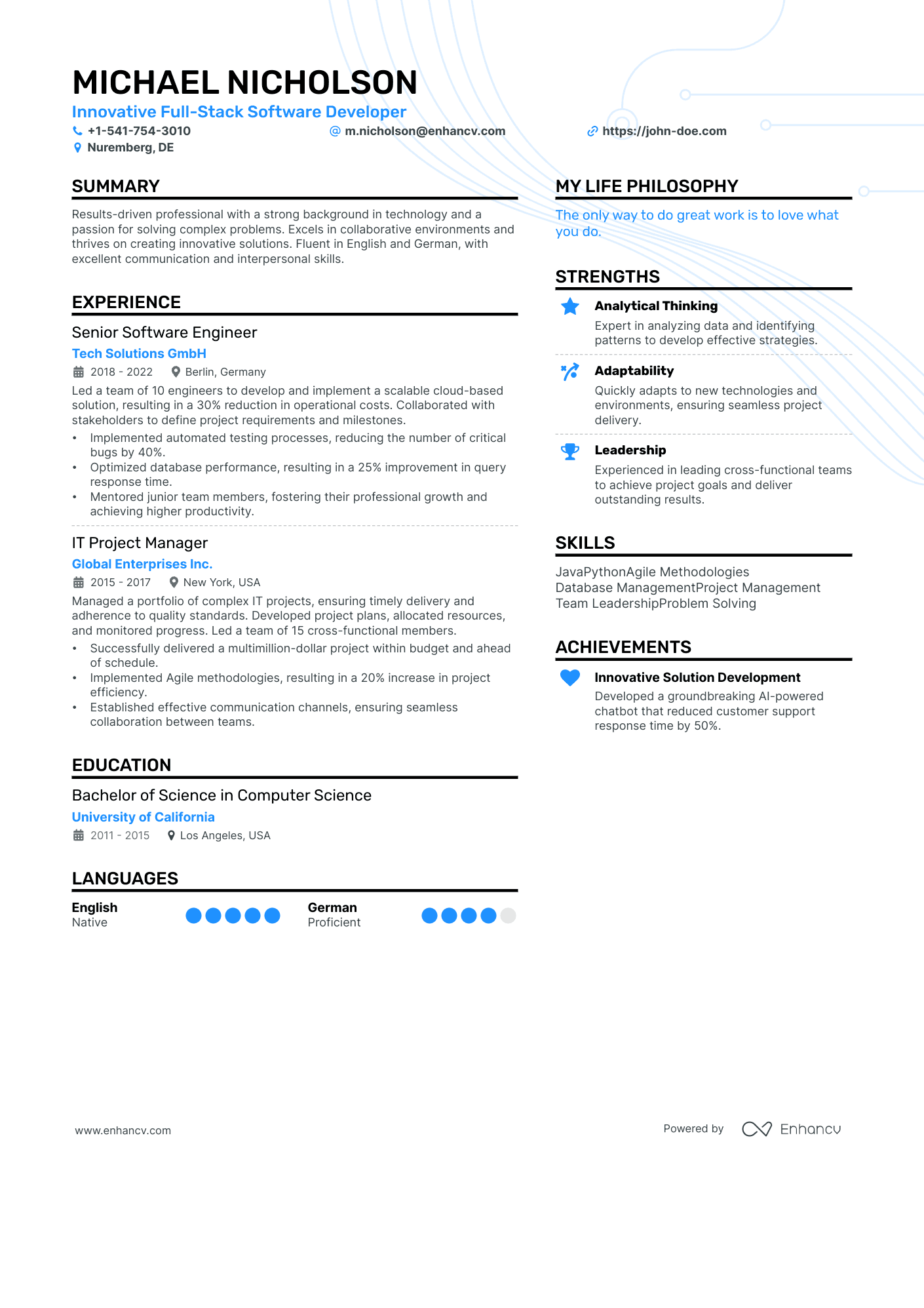
The German resume format, also known as the "Lebenslauf," typically follows a standardized structure that includes personal information, professional experience, education and training, skills, and other optional sections like volunteer experience and hobbies.
German employers often prefer a chronological listing of work experience and education, emphasizing the applicant's qualifications and accomplishments that align with the job qualifications they are seeking. Formal language and style are also important in a German resume, reflecting the applicant's attention to detail and professionalism.
We will review the crucial components of a German resume and offer hints on how to arrange them well. By adhering to these recommendations, you can write a clear, concise summary that shows your abilities and work history and persuasively pitches you to potential employers.
1. Personal Information (Persönliche Angaben)
You will have to list your details. This section is essential to your resume as it provides the employer with information about who you are and how to contact you. Ensure to include the following:
- First and last name: Usually, Germans have one first name and one last name. However, for those with longer names (such as having two first and two last names), using the name you prefer to be called by and your last name on your German resume is recommended. It can help ensure clarity for the employer on which name to use.
- Date (Geboren): Written DD/MM/YYYY.
- Nationality (Staatsangehörigkeit): This can help the employer understand whether they need to provide you with a work visa.
- Marital status (Familienstand): This information is optional and often considered outdated. However, some employers may still request it.
- Contact Details: Include your Phone Number (Telefonnummer), Address (Adresse), Email (Mail), and Online profile, e.g., Linkedin. Ensure your email address is professional and appropriate for job applications.
- Passport size photo
When creating your Personal Information section in a German resume, keeping it concise and pertinent to the position you seek is crucial. Avoid including irrelevant personal details such as your social security number or religious beliefs. Please stick to the essential information and ensure it is accurate and current.
2. Professional Experience (Persönliche Erfahrung)
The Professional Experience section is crucial for highlighting your employment experience and showcasing your relevant qualifications. In your German resume format, each previous role must be listed separately, with dates of employment in the left-hand column and corresponding details on the right-hand side. These details typically include the following:
- List of prior positions ordered chronologically.
- Include the job title, company name and location, employment dates, and a brief description of the duties and accomplishments of every position you mentioned.
- Highlight relevant work experience that matches the job requirements.
- Maximum 3-5 bullet points detailing each position. Start each bullet point with an action verb and quantify your achievements whenever possible.
- If you have gaps in your employment history , explain them briefly and honestly.
Suppose you have any volunteer or internship experience. In that case, it is more typical for German resumes to list that information in the same section as other paid work experience, provided it is relevant to the position. It would help to organize these responsibilities into your career timeline, showing when and where you assumed them.
3. Education and Training (Schul-und Berufsbildung)
Depending on your needs and profile, you can put this section before or after the work experience section. If you are a student or new to the job market, having a solid academic background at the beginning of your German resume might impress the hiring manager more than listing only your work history.
This section should be organized chronologically, with your most recent education or training listed first. Here are some key points to keep in mind when creating your Education and Training section:
- Include the institution's name, the certification or degree you earned in your study area, and the dates you attended.
- If you have multiple degrees or certifications, list them in reverse chronological order.
- If you are a new graduate with little professional experience, consider going into more detail about your schooling and academic accomplishments.
- Include them separately under the "Professional Development" or "Additional Skills" sections if you have proper training or certifications not affiliated with a particular academic institution, such as language courses or certifications specific to your sector.
- Incorporate solely the educational details pertinent to the position you seek. For example, if you have a degree in a field unrelated to the job, including all the components may be optional.
- If you have not completed a degree or certification program, indicate your current status (e.g., "in progress" or "anticipated graduation date").
While producing a German resume, you should illustrate the equivalents for your credentials and grades if you decide to include them. This is because different educational systems exist in other parts of the world.
Additionally, German hiring managers will understand if you have attended a school using the International Baccalaureate (IB) grade system.
As you proceed to higher education, German universities are divided into multiple sectors, and the applicable one will be based on your specialization.
University or College (Universität)
Teacher College (Pädagogische Hochschule )
Art of College (Kunsthochschule)
Institute of Technology (Fachhochschule)
Training Center (Administration Fachhochschule)
Applicants must frequently submit official certificate translations for their German employment applications.
4. Skills (Fähigkeiten)
Making your German resume stand out may seem challenging because recruiters typically want only factual information rather than persuasive arguments. However, adding a skills section to your resume could help catch the hiring manager's attention without appearing boastful.
To do this, use bullet points to list a mix of soft and hard skills related to the vacancy or sector you're interested in.
- List of relevant technical, language (also the proficiency level ), and soft skills
- Highlight skills that match the job requirements
- Driver’s license: If a job requires you to drive the company car for events or other purposes, it is important to include your driver's license and specify what type of vehicle you are qualified to drive.
Additionally, include any important accomplishments or certifications.
5. Volunteer Experience (optional)
The volunteer Experience section is optional but can be a great way to showcase your skills and dedication outside of paid work. Here are some key points to keep in mind:
- Include any volunteer work or community service you have participated in, especially if it relates to the position you are applying for.
- Describe your role in the organization and your responsibilities.
- Highlight any leadership positions you held or any accomplishments you achieved.
- Be sure to include the dates of your volunteer work and the organization's name.
Volunteer work can be a useful addition to your German resume and show your character, work ethic, and dedication to improving your town.
6. Hobbies and Interests (optional)
Feel free to provide any interests or hobbies relevant to the role in this optional section. Note that Germans enjoy facts, so if you include this section, keep it succinct and to the point. Here are some key points:
- Keep this part brief and concentrate on accomplishments that speak well of you and may apply to the position or field you seek.
- Avoid mentioning political or controversial interests because this could hurt your hiring chances.
- Provide examples of your innovation, leadership, teamwork, or dedication in your actions.
- Sports or physical activities demonstrating discipline, tenacity, or a competitive spirit can be considered.
- Do not add pastimes seen as frivolous or time wasters, such as watching TV or playing video games.
Just briefly mention hobbies and interests that showcase relevant skills or achievements. Avoid including irrelevant hobbies or interests.
7. References (optional)
A references section is optional and may not be necessary to include in your CV. Have the following in mind:
- Only include references if specifically requested by the employer or job posting.
- If you do decide to provide references, be sure first to get their approval and let them know what position you are looking for.
- List your references in a separate document rather than directly in your resume.
- Include each reference's name, title, company, phone number, and email address.
- Consider including testimonials from former managers or coworkers who can attest to your professional background.
Remember to include the References section only if specifically requested, as it is not always necessary. Be sure to obtain permission from your references and provide their contact information in a separate document.
German resumes can be a helpful way to better understand the format and style expectations. Look at the example of a German resume below:
Personal Information (Persönliche Angaben)
First and Last Name: Hans Schmidt
Date of Birth: 12/06/1990
Nationality: German
Marital Status: Single
Contact Details:
Phone Number: +49 123456789
Address: Musterstrasse 1, 12345 Berlin
Email: [email protected]
Online profile: LinkedIn
Professional Experience (Persönliche Erfahrung)
Marketing Manager, ABC GmbH, Berlin (04/2018 – present)
- Increased social media following by 30% and website traffic by 40% through targeted campaigns
Marketing Coordinator, XYZ AG, Munich (06/2016 – 03/2018)
- Conducted research and analysis to evaluate campaign effectiveness
Education and Training (Schul-und Berufsbildung)
Master of Business Administration (MBA), University of Munich (09/2014 – 06/2016)
Bachelor of Science in Marketing, University of Berlin (09/2010 – 06/2014)
Skills (Fähigkeiten)
- Advanced knowledge of Microsoft Office Suite
Volunteer Experience (Ehrenamtliche Erfahrung)
Volunteer, Red Cross, Berlin (01/2017 – 12/2017)
- Mentored at-risk youth in a local community center
Hobbies and Interests (Hobbys und Interessen)
- Running: Completed three marathons and regularly participated in local races.
References (Verweise)
Available upon request.

- Resume Guides
How To Write A Farewell Email To Colleagues (Plus 4 Examples)
The secret to finding keywords in job descriptions, how to send an introduction email to a recruiter (sample included), what to do when i forget to attach my resume, what are the parts of a resume, should i bring a copy of my resume to an interview.
- Create Resume
- Terms of Service
- Privacy Policy
- Cookie Preferences
- Resume Examples
- Resume Templates
- AI Resume Builder
- Resume Summary Generator
- Resume Formats
- Resume Checker
- Resume Skills
- How to Write a Resume
- Modern Resume Templates
- Simple Resume Templates
- Cover Letter Builder
- Cover Letter Examples
- Cover Letter Templates
- Cover Letter Formats
- How to Write a Cover Letter
- Cover Letter Guides
- Job Interview Guides
- Job Interview Questions
- Career Resources
- Meet our customers
- Career resources
- English (UK)
- French (FR)
- German (DE)
- Spanish (ES)
- Swedish (SE)
© 2024 . All rights reserved.
Made with love by people who care.
German Resume / CV Format
Amali ranasinghe.
German CV format is not too different from the other resume formats. Yet, you need to pay attention to the key aspects of the standard format as listed below.
- Start your resume with Personal Information (Persönliche Daten)
- Next, you can add your Career Summary statement (Kurzprofil) which is not mandatory.
- The work experience section should come next. (Berufserfahrung)
- Next comes the Education Highlights section. (Ausbildung)
- Finally, add the Skills section. (Kenntnisse und Fähigkeiten)
- It's important to know that adding your hobbies and interests is also not mandatory.
If you are looking for an easy way to build a German Tabular CV (Lebenslauf), you can try out our 100% free resume builder below.
If you have no idea about the section needs to be included, please continue reading!
What's the ideal length of Germany resume format?
The ideal length of a Germany resume template would not exceed two pages. This is where whether you add the optional sections discussed above comes into play. If you still can write your resume within 2 pages including the career summary along with hobbies and interests nothing should go wrong.
Font size and font face - German Resume Example
- Font face/ type - It's better to use a simple font face with clarity when it comes to a German CV. Some of the recommended font faces are Roboto, and Times New Roman.
- Font size - For headings, you can use 14 pt. - 16 pt., whereas for other general content, use 11 pt or 12 pt.
Most importantly, make sure to keep your format consistent in terms of font size and font face. Also, labeling the sections of your CV with proper headings is mandatory, as professionalism is one of the major qualities expected by German recruiters.
How to write personal details in German resume?
In the Personal Details section, including the following information is compulsory.
- Your Name: Here, you can add the first name and the Surname/ Family name. It's not wrong to emphasize this with a bigger font and with boldface as depicted in the German sample below.
- Contact details: For this, it's expected to provide an email as well as your contact number. If you are an offshore applicant, it's essential to include the country code in the contact number.
- Residential Address
Apart from the above key details, you can add optional information as stated below to create a better picture of yourself as a candidate.
- A professionally taken photo
- Date of Birth
- Citizenship/ Visa: This helps to determine your work rights in Germany.
German CV template / sample / example in English is readily available for you now below. Get access to German resume / CV template free download now.
How to write Career Summary in German resume?
If you choose to have a career summary that is optional in the German resume, still you need to think of its effect on the reader. For example, your summary can focus on one key aspect of yours such as highlighting your strengths as a good fit for the role, your expertise in the role, etc.
Most importantly, don't make it too long. An ideal career summary in German CV layout / model can be a maximum of four lines in length.
Work History and Education summary guideline
Work history - germany cv template.
German recruiters prefer the reverse chronological order . For example, add the most recent records first and move from there. In each employment record, add the following details.
- Name of the company followed by the city (if in Germany) or the country (if offshore)
- Job duration along with the years and months
- A brief list of the most important responsibilities that you held in the role. Limit the points maximum up to 8. If you have a lengthy record of work history, rather than listing out the responsibilities, you can give a brief description of it.
Check out the sample below.

Education History - German Resume Example
Education summary too should be added in the reverse chronological order. In each record, add the following.
- Name of the University/ College/ Academic body
- Title of the qualification
- Duration of your studies
- GPA if applicable (optional)
Here's a sample of how to add education history in curriculum vitae in Germany CV format / template.

Other tips for German CV (CV German Template)
- Once you create your CV for applying to jobs in Germany, you are advised to scan it using a CV scanner to find out the possible harmful words or action verbs in your CV.
- While action verbs can increase your chances of getting hired, some overused buzzwords (clichés) may narrow down your chances. You can use the Resume Buzzword Scanner below to scan your CV and make sure that it does not contain any buzzwords.
- When it comes to work history or education records, use only related records for the job you apply for. If you fill your resume with unrelated records, it won't be a good sign as an ideal candidate. Also, it's good to know that CV in tabular form in Germany (curriculum vitae in tabular form German) is an acceptable approach as a German CV template.
- Now you can request for a 100% free German CV / resume template in English in PDF of Word format. All you have to do is fill the brief form below.
- Sometimes, you will have to write your CV in German language. This is the case either if you have to send the CV for German university or if the job itself was published in German. If that's the case, the employers expect the candidates to be competent in using the German language.
If you are keen on other international resume formats, you can explore them such as UAE CV format , Italian CV format , USA Resume guide and many more from our International Resume Format page now.
German CV Template in English [Ultimate English Guide]
Researched & written
by Jen Palacios
March 21, 2024
If you’re searching for a German-style CV in English that will increase your chances of nailing more job interviews in Germany, then you’ve come to the right place!
In this guide, you will find tips for creating a CV that follows the German format, as well as the chance to purchase our German CV template in English that you can use on your next job application.
According to a recent study done by Stepstone, 91% of HR recruiters name the CV as the most important document of an application .
Recruiters and HR spend less than 30 seconds scanning a CV before deciding whether it goes to the next round or not.
🖌️ Table of Contents
Simple German-style CV template in English
A CV is the first impression you will make. Like all first impressions, your CV only has a few seconds to impress hiring managers. The goal of your CV is to get you an invitation to a job interview .
“Remember, the person reviewing your CV may review 50+ others that day. Making it easy to quickly understand your information will make you stand out more than a quirky design or information overload.” by Jamie Rogers, Tech Recruiter in Germany working for Darwin Recruitment
We highly recommend investing some time in polishing your CV before applying for jobs in Germany. Here is an overview of the format German HR, recruiters, and hiring managers would expect in a CV:
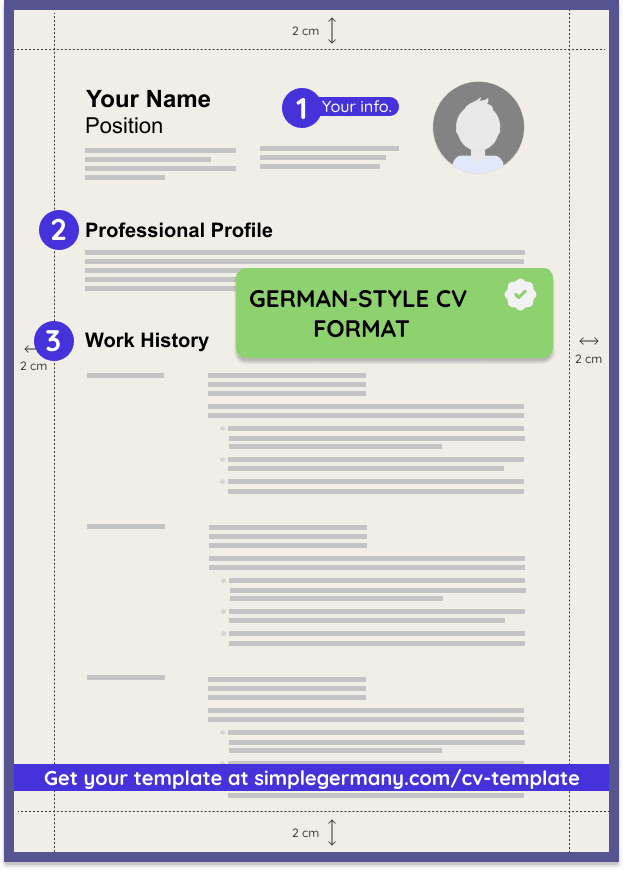
If you don’t want to spend time designing your own CV, you can download our German-Style CV template in English from our shop.

- Easy-to-edit CV template in English that follows German standards for Microsoft Word and Mac Pages
- 2 REAL WORLD CV Examples
- 50-page in-depth guide to nail each section in your CV
- 30-day money-back guarantee
How to write a German CV ( Lebenslauf ) in English
The expectation of a German recruiter might be different than what you are used to.
The German CV ( Lebenslauf ) is considered less of a marketing product and more of a factual document. You are encouraged to write real, hard facts and avoid all kinds of fluff or self-promoting sentences. HR departments in Germany prefer the KISS method: Keep It Short & Simple.
In Germany, a CV is between one and a maximum of two pages and has five or six sections. Let’s explore each one in more detail.
1. Personal Information
The minimum personal details you should include in this section are your name and your address. German recruiters expect to see a few more personal details about you, though. So if you don’t add all the personal information described below, be prepared to answer some similar questions during your interviews.
Good To Know
Just like in many other countries, it is illegal for companies to reject an application based on gender, age, race, or sexual orientation.
Most Germans include additional personal information in their CV. As an expat, it is important to understand how this extra information might help you in your application.
- Passport size photo : As per Jamie, a tech recruiter in Germany, “ a profile picture should be professional but not too formal. Think happy, welcoming, and relaxed – not a formal suit and tie (unless you are searching for a job in law or finance). ” Germans will judge your professionalism based on this picture, so make it count! There are some foreign names that Germans are not used to hearing, so providing a photo might help them know what pronoun to use for you.
- First and last name : Germans usually have only one first name and one last name. For those who have long names (I have two first and two last names), I would recommend using the first name you want to be called by and the last name. This reduces confusion on the employer’s side on what name to use. I had an Egyptian colleague who added all of her names to her application, and this led to confusion. The employer took her first two names and considered them to be a first and last name. This was a mess when they sent her the contract and set her email address.
- Address : Don’t forget to include your country!
- Phone number : Only add this if you have a German phone number . If your phone number is required, make sure to add it with the correct country code.
- Email address : Use a professional email address consisting of your name.
- Nationality : This could help the employer know if they will need to sponsor a work visa for you or not.
- Date of birth : Written DD/MM/YYYY.
- Short profile (optional) : A summary of your skills and qualifications. Mention in two to three sentences why you are relevant for the job you are applying for.
Additionally, feel free to add professional social networks, such as LinkedIn or the German Xing. If you are a techy, you must include your GitHub !
2. Work Experience
Start with your most recent job and highlight relevant experience for the position you are applying. For each position, make sure to include the:
- Name of the company
- Title of your position
- Type of work you did : For example, part-time, full-time, internship, just for the project, etc.
- Dates you were employed : Include the month and year.
- Country
- Key responsibilities : We recommend listing your responsibilities as bullet points to make it easier for the reader to scan through your CV. Remember to stick to the facts.
- Translate achievements: Be sure to translate your responsibilities into factual achievements, e.g. increased sales by 20% or increased conversion by 15%.
Germans like to read ‘gapless’ curriculum vitae. So if you took a year off between your jobs to travel, you should mention this in your CV. Any gap above three months is worth mentioning in your CV.
Also, you are encouraged to mention any voluntary work you have done.
“Context is critical! That’s why ‘Work Experience’ is the most important part of a CV. It’s the part that we learn where and how you have applied the skills listed elsewhere in a CV.” by Jamie Rogers, Tech Recruiter in Germany in Darwin Recruitment
3. Education
This section should have your education, including secondary and higher education. You should list your latest education degree first. Each degree should include:
- Name of your university or school
- Program that you studied
- Period you studied for : make sure to include the month and the year
- City and country you studied in
Use this section to list any other relevant qualifications or skills to the role. Some examples of what you can include are:
- Languages : Make sure to indicate the language and the proficiency level
- Computer skills : Mention any IT skill you have which is relevant to the position
- Relevant achievements or certificates
- Driver’s license (optional): Some jobs might require you to drive the company car to go to fairs or for other purposes. So make sure to include the driver’s license you have and for what type of vehicle.
Read Our Related Guide
German Driving License Explained
5. Hobbies And Interests (Optional)
In this optional section, you can feel free to include any hobbies or interests that might be relevant to the position. Remember, Germans love facts, so if you add this section, make it short and sweet.
Also, try to be specific about your interests. Travel is very generic, and almost everyone loves to do it.
6. Your Signature
Bonus points if you add this to your CV. Germans usually sign their CV with the date and their name.
Once you have created your CV, download it as a PDF and then digitally sign it by using a tool like Smallpdf .
German or English – In which language should you write your CV?
If you are applying for an English-speaking job, it is a good idea to write your CV in English. Since you are applying for a job in Germany, chances are a German person will look over your CV. If you are learning German, you can write your CV in English and indicate in the language section that you are currently learning the language.
Can I work in Germany without speaking German?
If your German level is good enough, go for it! Just a word of caution, though: Germans, like any other sane person, dislike typos and grammatical errors. So you better have a native German proofread your CV. Also, make sure only to do this if your German is good enough to handle the interview in German as well. If you create your CV in German, you are already setting the expectations for your future employer that you have good German skills.
Regardless of the language you choose for your CV, make sure to follow the standards German hiring managers expect.
Final Thoughts
In this guide, you learned that a CV in Germany is a one to two-page factual document, and it is not used as a promotional tool. You can add your soft skills and other details of your experience in your cover letter .
German Cover Letter Guide with English Sample
German recruiters and employers expect to receive an application free of typos and grammatical mistakes. So only send your CV in German if you are truly confident with the language.
Download our German-Style CV template in English from our shop to save you time and clear all potential doubts about what to include in your resume for the German job market.
Remember only to include information that is relevant to your role and the job requirements. Now, it is time for you to scout the job market in Germany and get your dream job.
Happy job hunting!
7 Hacks To Save Money In Germany
Get our FREE guide with 7 actionable hacks to save money while living in Germany. 7 days, 7 emails!
About the Author
Jen Palacios is a researcher and writer at Simple Germany specializing in aiding international skilled workers to navigate the complexities of German life.
Jen brings a unique immigrant perspective to her writing. Beyond her professional pursuits, Jen is an avid learner with interests ranging from woodworking to web development.
She is committed to writing guides and producing YouTube videos for Simple Germany that provide practical guidance for internationals aiming to settle into life in Germany more smoothly.
You Might Also Enjoy These Guides
Can i work in germany without speaking german [2024 guide], german payslip explained: how to read your payslip in germany, german cover letter guide [with english sample], unemployment benefits germany [2024 english guide], sick leave in germany [a 2024 english guide], job interview in germany [how-to + tips in english].

Empowering internationals to settle into life in Germany more smoothly.
- Germany Explained
- Service Providers
- Brand Assets
Buy Us A Coffee
Cookie Policy
Privacy Policy
Refund Policy
in Düsseldorf
© All Rights Reserved. Simple Germany is a trademark registered in the European Union.
As an Amazon Associate we earn from qualifying purchases.
- NETHERLANDS
- SWITZERLAND
German CV guide (Lebenslauf)

Having a good curriculum vitae (CV, or Lebenslauf in German) is quite probably the most important step in finding a job in Germany . However, there are some small but crucial differences you need to be aware of when writing your CV. Getting it right, by formatting your resume in a style German employers will recognise gives you the best chance of landing an interview .
Useful websites for writing CVs in Germany
Follow these links to find more hints and tips on applying for jobs in Germany, CV templates and more:
How to write a CV ( Lebenslauf ) in Germany
In contrast to CVs in many other countries, CVs in Germany are simple “fact sheets”, listing experience, skills and education in a way that is free from embellishment, business jargon or buzzwords. Instead of being a sales pitch, German CVs let the facts speak for themselves. To a lesser extent, the same principle also applies to cover letters .
Although, of course, there is no perfect way to write a CV in Germany, in general, they tend to follow the following structure:
1st section: Personal information ( Persönliche Angaben )
In this first section, you list your personal details. Make sure to include the following:
- First and last name
- Date of birth
- Nationality
- Marital status
- Contact information
- Passport-size photo
- Profile ( Profil ) - a short description of yourself and your skills / experience / qualifications
2nd section: Education ( Ausbildung )
In this section, you detail your education (including secondary and higher education ). Make sure to include the name of your university and the programme you studied. Many people also include specific modules or areas of study within the degree programme that are relevant to the position.
3rd section: Work experience ( berufliche Erfahrung )
List your previous work experience in reverse chronological order, starting with the most recent. For each position, include the name of the company, the dates you worked there, the title of the position you held, and your key responsibilities. Here is a good place to also outline any major achievements, but make sure you stick to the facts.
Final section: Other skills / achievements ( Sonstiges )
You can use this section to list any other qualifications, skills or achievements that are relevant to the role, such as computer skills, language abilities or certifications . German CVs don’t typically include details about personal interests or hobbies, which are considered superfluous by most hiring managers.
Should I write my CV in German or English?
If your language ability is up to it, it’s a good idea to write your CV in German (unless the job profile specifies otherwise). German is the language generally spoken in the workplace, even if the official company language is English, and speaking it may give you an edge over other candidates. On the other hand, if you have little or no German, writing your CV in German may give a false impression that your language ability is better than it is.
Tips for writing a German CV
- Keep it factual; waffle and fluff do not go down well in the German job market.
- Listing all of your experience, skills and qualifications may not necessarily be helpful - keep it to the point by only listing those that are relevant to the role.
- Recruiters scan numerous CVs for the same position, so get yours noticed by keeping it short - no longer than two pages.
- Make your CV appealing by choosing an appropriate font; avoid dense writing and too many bold or underlined sections.
- Keep it snappy by using bullet points rather than long paragraphs.
- Adjust your CV for different applications to make sure everything you list is relevant to the role you are applying for.
- Be aware of linguistic errors and typos - double, triple, quadruple check it and ask for a second pair of eyes!
- Check out our other employment guides and tools for tips on finding a job in Germany.
This page uses affiliate links.
Follow us on Facebook

IamExpat Jobs

Recruitment agencies in Germany

Career coaches in Germany

Job interview questions & Answers in Germany

Cover letter in Germany (Anschreiben)

Working in Germany

Employment guides & Tools
German Resume Examples & Writing Tips (+ 6 Templates)

Germany is one of the countries in Europe that has tremendous career opportunities for English-speaking candidates from around the globe.German companies are known for their precision and attention to detail. That's exactly what they're looking for in a German resume.
German resume example
Ben Stroke Direktionsassistent https://www.linkedin.com/in/benst
Persönliche Daten
Ändern : 28 Geschlecht männlich Beziehungsstatus: Verheiratet E-Mail: [email protected] Telefon: 0211 4535961
Master in Strategischem Marketing, 2018-2019 Columbia University, New York
Bachelorstudium Betriebswirtschaftslehre, 2014-2018 Columbia University, New York
Arbeitsgeschichte
K-Mart Supermarkt Stellvertretender Filialleiter August 2017 bis heute New York City
- Verwaltetes Inventar für 3 Einzelhandelsgeschäfte, einschließlich Quittungen und Retouren
- Durchgeführt Rekrutierung für Geschäfte
- Verantwortlich für das Erreichen der monatlichen Umsatzziele
Erobern Sie Restaurants Stellvertretender Restaurantleiter Juni 2014 bis August 2017 New York City
- Verantwortlich für Menüänderungen und Verfügbarkeit
- Social-Media-Marketing für Seiz
- Verantwortlich für die Verbesserung der Kundenzufriedenheit und Bewertung
- Zusammenarbeit mit Marketingagenturen von Drittanbietern
Fähigkeiten
- Verhandlung und Kommunikation mit Lieferanten
- Starke Führung
- Budgetierung
- Digitales Marketing
- Datenanalyse
Fähigkeitszertifizierungen
- Abgeschlossene digitale Garage von Google für digitales Marketing und SEO
- Microsoft Office-Spezialist: Excel Associate abgeschlossen
- Social-Media-affin
- Verfassen eines Newsletters zum Thema Marketing (3000+ Leser)
A German CV is called Lebenslauf – a factual document of the information of the candidate. This CV is quite different from a typical American-style resume. To get a well-paid job in Germany relevant to your area of expertise, you should be able to write a perfect German CV.
Whether you are a student looking to emigrate to Germany or a professional looking to work overseas in a German-speaking company, this article will help you:
- To find the best resume format and layout
- To pick the right cv templates that fit the German Corporate Culture
- To write each section of the German CV
- To identify the DOs and DON’Ts in writing a German-style resume
We will also cover everything you need to know about writing a CV for jobs in German-speaking countries like Austria, Switzerland, Belgium, and Liechtenstein.
In order to demonstrate the correct structure of a German resume, we have provided an example resume for an assistant manager:
The Facts of the German Job Market
Germany’s salaries are among the highest in Europe. Statistics suggest Germany’s average salary is around 42,500 Euros a year 💰 ( statista.com ), whereas Switzerland, Luxembourg, and Iceland top the list with 65k, 66k, and 67k annual salaries consecutively.
Nevertheless, Germany is a popular destination for English-speaking professionals and workers to settle in relatively good careers.

Differences Between the German-style Resume and the American-style Resume
German CV specifications and American standards have many differences. Most standard resume practices in Germany are affected by their culture and the way the corporate works.
For instance, strict labor laws in Germany have made it difficult for companies to fire employees – making recruitment decisions critical. Most recruiters expect much detail about the candidate before making a final decision.
Here is a list of differences between the CVs in the two styles👇
- Called Resume
- Marketing product – sales pitch of the candidate
- Including a picture could disqualify your application
- Personal information shouldn’t be included
- One page standard
- Emphasizes performance and numbers
- Resumes start with a professional summary
- Reference letter not sent together
- Candidate’s signature not included
- Colorful, attractive resume templates are used
- Called CV (Lebenslauf in German)
- Factual document – no fluff
- Including a picture is required
- Personal information such as age, address, and marital status
- CV could be several pages long
- Emphasizes organization, duties, and responsibilities
- A professional summary is not included in the CV
- A reference letter from the previous employer should be sent along with the CV
- The candidate’s signature, place, and date should be included at the bottom
- Resume templates with minimal formatting should be used
Nevertheless, multinational companies have started to seek American-style resumes when hiring for their German subsidiaries. Most of the small and medium-sized businesses in Germany still prefer their own style of CVs.

How to Write A German Resume
As in writing any resume, you should first start with defining your CV layout, format, and template.
A typical German resume layout is as follows:
- Resume header
- Work experience
- Additional sections
The main difference in this layout is that it does not have a Professional Summary or an Objective Summary as in most American-style resumes. German resumes are considered factual documents – that do not include a sales pitch about the candidate.
The format defines the way you present your experience section. There are mainly three standard formats:
- Functional (skill-based): experience is listed based on the relevant skills.
- Reverse Chronological (traditional) : The most recent experience is listed first, followed by the rest of the work experience in reverse chronological order.
- Hybrid (combination resume) : a combination of functional and reverse chronological formats.
For the German resumes, we recommend using the reverse-chronological format to list your work experience as German hiring managers are more interested in your recent experience.
German CV Template
Picking the right resume template would be extremely important as German CVs are not considered a good place to showcase your creativity. However, a CV template could still be used to make a great first impression.
The recruiters prefer CVs with limited colors and text formatting. Therefore, use a template that is simple yet well-structured. Avoid using contrasting colors, or different fonts.
You can check out some of our ready-to-fill resume templates for your next German resume.
Create my CV
Begin Your German CV with The Header
As in American-style resumes, German CV starts with the header – but keep in mind the header in a German resume is way different than the American one.
Compared to an American resume that contains the name and contact information in the header, a German resume includes personal and contact information (Persönliches und Kontaktinformationen) .
Personal details
This shows a major difference from American resumes. German recruiters expect a certain level of personal information of the candidate to make a hiring decision. You can always choose not to disclose some of this information though.
- Name - Name
- Marital status - Familienstand
- Age/ Date of birth - Geboren
- Nationality - Staatsangehörigkeit
Contact details
Contact details should include the following:
- Address - Adresse
- Phone number - Telefonnummer
- Email - Mail
- Link to your personal portfolio or the LinkedIn profile
https://www.linkedin.com/in/levid
Gender: Male
Marital status: Single
Email: [email protected]
Phone: 0211 3465978

The photo: Vital on The German CV
Another important part of a German resume header is the attachment of a professional photo of the candidate. This is a common practice in Germany whereas, in America, Canada, the UK, Australia, and some other countries, this is considered a capital offense – one that can send your CV straight to trash.
While you selecting a template , make sure you pick one with space to add a picture.
Here are the key photo guidelines you should consider:
- The photo should be a professional headshot – showcasing head and the shoulder only
- Dress appropriately for the photo. Try to wear low contracting colors that go with the resume colors
- Consider hiring a professional photographer
- Choose a suitable background color or a composition
- Keep your eyes on the camera
- Smile and let your personality shine through
- Do not use selfies
- Avoid distracting hairstyles or fashions
- Avoid holiday or party photos
Experience (Berufserfahrung)
As in the American resumes, you should use reverse-chronological format to write the experience section – starting with the most recent experience and going backward.
What is different here is how you write the section and the information you provide about the previous employer.
Steal this format to write your experience section👇
- Company name and industry
- Job title: you can list multiple job roles you held in the same company
- Time period
- Location: State the country and the region
- Description: Short description highlighting the duties and key responsibilities you held and the type of work you carried out
Writing the description in your work experience would be quite different from an American resume. Here, you do not have to write about the skills utilized while doing the job, achievements in your job, or the accomplishments – only write the factual information about your work.
In contrast to American resumes, instead of writing about jobs that are irrelevant to the position you apply for, write about an internship or a volunteering work you have participated in.
Here is an example experience section for a teacher:
Sprachlehrer
Aug 2018 to May 2021
- Kursmaterial für die Sprachen Deutsch, Englisch und Französisch erstellt
- Vorbereitete Aufgaben und Tests
- Durchführung von Klassen für Schüler der Sekundarstufe und des
- Einzelne Klassenaufzeichnungen aktualisiert
- Verantwortlich für den jährlichen Modulwechsel
Education (Ausbildung)
The education section in German resumes usually come before experience. This is partly because German hiring managers give more value to your education and skills rather than your achievements.
However, you can place this section before or after work experience based on your profile – if you have a strong academic background, you could give priority to the education section.
When listing your education, use reverse chronological format to state the latest education qualifications first.
Both your secondary education and higher education are important for the German CV.
German GPA scale system is different from the USA system which ranges from 5 (the lowest) to 1 (the highest) as opposed to the USA scale system which goes from 0 (lowest) to 4 (highest).
If you possess good grades that you want to communicate, make sure you do that without confusing the German employers.
Shortly state the key learnings of each degree or educational qualification.
Here is an example education section for a German resume:
Bachelorstudium Betriebswirtschaftslehre, 2013-2016
Australische Nationaluniversität
- Rekrutierung
- HR-Strategie
- Arbeitgebermarke
Höheres Nationales Diplom in Informationstechnologie 2018-2019
Institut für Informatik, Melbourne
- Fortgeschrittene Computerkenntnisse
- C-, C++-, Java-Programmierung
Skills ( Fähigkeiten)
Unlike in the American resumes, you should not use the skills section to promote yourself in the German CV – as your resume should only include factual information.
Write a mix of soft skills and hard skills giving priority to your hard skills.
Soft skills
These are the skills that characterize your relationship with others and provide the recruiter an idea as to how you behave under different situations. These are more generic skills and difficult to prove.
- People skill
- Negotiation and communication skills
- Business intelligence
- Problem-solving
- Organizational skills
Hard skills
Often based on your most recent job experience or education. German recruiters value these because they are industry-specific.
- MS Office 360 (Word, Excel, Powerpoint)
- Programming in Java, Python, C++
- Object-oriented programming
- Artificial Intelligence
- Saas product marketing
Refer to the German job description to find out the key skills they’re looking for. Five to seven skills in bullet points would be ideal.
About Me: Summarize Your Professional Profile
The professional summary section accounts for the major difference between American and German-style resumes.
In American resumes, a professional summary stands as a sales pitch to the hiring manager highlighting the key skills, expertise, and achievements of the candidate. It also emphasizes why they should hire the candidate and how his/ her expertise could be beneficial to the company.
German resumes on the other hand do not require such sales pitching from the candidate – it’s a factual document of the candidate’s education, experience, and skills.
Therefore, a German resume does not consist of a professional summary .
However, if you’re applying for a multinational in Germany with foreign management, you may still include a professional summary on your resume. If you wish to include one on your resume, below is an example that may help. 👇
Professional Summary for a Software Developer
Ein Softwareentwickler mit über 5 Jahren Erfahrung und praktischer Erfahrung in C++, JAVA, Python und PHP, der nach einer Gelegenheit in einer leitenden Position sucht
Ein leidenschaftlicher Software-Ingenieur mit über 5 Jahren Erfahrung freut sich darauf, GETECH in Deutschland beizutreten, um die auf künstlicher Intelligenz basierende Produktlinie auf die nächste Stufe zu bringen. In meiner vorherigen Position bei US TECH habe ich einen KI-basierten Videoersteller mit Python und JAVA entwickelt, der für 20 Millionen US-Dollar verkauft wurde
Professional Objective
A Professional Objective is similar to a Professional Summary, which you should not repeat on the resume. The Professional Objective is intended for those with limited work experience: students and candidates going through a career transition.
However, we advise you not to include this section on your German resume.
Additional sections for your German Resume
Additional sections are a great way to provide factual information that will influence the HR recruiter’s decision. Below we have highlighted the type of additional sections you can include in your German resume. Take a good look and only include the sections that are relevant to your personal profile.

Language proficiency is something that most recruiters are concerned about. If you are an ex-pat looking for an employment opportunity in the Germany, having proficiency in German language would be a big plus.
Your fluency in English and other EU languages will give you an edge in the shortlisting process.
When you are writing the language section, have a look at the Common European Framework of Reference ( CEFR ).
English Proficiency
German Intermediate
French Beginners
Also, check out our ready-to-fill resume templates where you can find plenty of German-style resume templates that come with simple yet great features to demonstrate your language proficiency and other sections.
Computer Skills & Certifications
If you have completed any course on computer science, programming, or information technology, you may list them here.
Having basic computer and system literacy would be valuable in any job as German companies employ many computer-based systems in their businesses.
Some jobs in Germany require the candidate to present a valid skills certification. Mention it if you already hold one. If not make sure you apply for one immediately. For instance, if you are applying for a job that involves you driving a vehicle, you should have the required EU driving license.
Publications
If you are a student or applying for an academic-related job, you may list the research papers and publications that are under your name.
German recruiters are a little biased towards the educational qualifications of the candidates. Therefore, if you have such academic achievements, make sure you put them in an additional section to gain more visibility.
Interests and Hobbies
This is another place where the German resume differs from the American one. You can list a couple of personal interests in your German resume.
However, make it relevant to the job you apply for.
- Reading books
- Collecting coins
- Watching Football matches
- Writing blogs for an international sports channel
- An active member of Toastmasters club
- Writing a monthly newsletter on technology
Candidate Signature
This final section completes the German resume: date and the signature of the candidate. As you have the flexibility to add a couple of pages to your German resume, keep space to put the date and signature at the bottom.
Do not put a separate section naming it as “Candidate Signature”. You can also put your e-signature here.

Tips to Improve Your Resume in German
Make your next German CV stand out from the crowd with these pro tips:
- Check the job description to determine whether the potential employer expects the CV to be in English or German
- Include a link to your LinkedIn profile or portfolio website in the header of your document. Verify that the link works in both PDF format and MS Word format.
- Choose the right resume template that matches German Corporate Culture as well as your personality – check out our ready-to-fill resume templates .
- Get your final CV draft checked by a native German writer.
- Prepare a cover letter to go along with your resume – check out our cover letter templates to get an idea
Summary: Write a Perfect German Resume
- Be factual rather than self-promotional.
- Include your name, contact information, and personal information in the header of your resume.
- Do not include a professional summary.
- The experience section should be succinct, and factual.
- Showcase your education qualifications together with key learnings.
- Include a combination of soft and hard skills.
- Use additional sections such as languages, skills certifications, and interests to demonstrate relevant extra traits.
- Put your signature and date at the end of the document.
- Your German resume could extend to a couple of pages (ideally 2 to 3).
Complement Your Resume with Your Cover Letter
A cover letter would be a great way to showcase your personality and achievements to the hiring manager.
As the German resume only focuses on the factual information of the candidate, the cover letter can be used to describe your interest in the company and the position.
You could write about your key achievements in the previous job, how your experience and skills helped the previous employer, and how that would be potentially valuable to the new employer.
Have a look at our cover letter templates to create a great cover letter for your German recruiter.
FAQs about the German Resume
What if i have a career gap in my german resume.
German recruiters are very much concerned about employment gaps in your CV. However, having career gaps is natural for most candidates.
If you have a gap in your career, you should disclose it to the recruiter without trying to hide it in the resume.
State what you did in that period. This may include volunteering, traveling, taking part in a research project, or taking part in an expedition. You should include this information in your German CV.
Should I write my CV in English or German?
It depends on the company and the position you apply for. If you’re applying for a job in a multinational organization in Germany, they would expect your resume in English. However, most German companies operate in Germany.
Refer to the job advertisement for the language requirements. Use the language of the job advertisement if there is no reference to the CV language.
Can I apply to jobs in Germany without speaking German?
The German market goes beyond its language. In many cases, even if you don’t master the German language, your English skills may be highly desirable. However, we do recommend having a basic command before aspiring to jobs abroad.
Create your resume with the best templates

What’s a Rich Text element?
The rich text element allows you to create and format headings, paragraphs, blockquotes, images, and video all in one place instead of having to add and format them individually. Just double-click and easily create content.
Static and dynamic content editing
A rich text element can be used with static or dynamic content. For static content, just drop it into any page and begin editing. For dynamic content, add a rich text field to any collection and then connect a rich text element to that field in the settings panel. Voila!
How to customize formatting for each rich text
Headings, paragraphs, blockquotes, figures, images, and figure captions can all be styled after a class is added to the rich text element using the "When inside of" nested selector system.
Create your resume in 15 minutes
Our free collection of expertly designed cover letter templates will help you stand out from the crowd and get one step closer to your dream job.


Sample letters to download

Cover Letter
Advice for getting a job, instructions.
- Value Package
- Blocked Account
- Health Insurance
- Current Account
- Study Finder
- Study Eligibility Checker
- Accommodation
- Learn German
What We Offer
- Bank Account
- Living in Germany
- Studying in Germany
- Working in Germany
About Germany
- German Cities
- Tourism in Germany
- German Culture
- Visa for Germany
- Costs of Living in Germany
- Finance in Germany
- Health Insurance in Germany
- Driving in Germany
- Renting in Germany
- German Universities
- Free Studies in Germany
- German Education System
- Germany vs. other Study Destination
- German Degrees
- Application Process to Study in Germany
- Financing your Studies in Germany
- Best Universities in Germany
- German Business Culture
- Best Cities in Germany for Expats
- After your Bachelor's in Germany
- After your Master's in Germany
- About Expatrio
- Partner log in
- Partner Log-in
How To Draft a Perfect German CV [Format and Template Guide]

Did you know that Germany is one of Europe's most economically stable and job-friendly nations? The German job market is so strong that many people migrate to Germany to find work.
Before you can begin searching for a job in Germany, you must first make sure your CV ( Lebenslauf ) is correctly formatted.
This guide will walk you through everything you need to know about drafting the perfect German curriculum vitae (CV). We'll start with an overview of the standard CV format in Germany, including tips for formatting, content, and design.
We'll also focus on critical elements that every CV should include. Finally, we'll provide you with a German CV template that you can use to get started on your job search.
Let us have a look at the Do's and Don'ts while drafting a CV!
What is a German CV?
A German CV is similar to a standard resume or curriculum vitae in other countries. It typically includes basic personal information, such as your name, contact details, and educational background. It also provides information about your work experience and skills, such as language proficiencies or technical skills.
Read on to learn more about the specifics of the German CV format.

German CV Format
The standard format is similar to structures used in other countries. However, there are a few key differences that you should be aware of. First, German CVs typically start with your personal information, followed by your work experience and education. Unlike in other countries, it is not mandatory to include a section on your hobbies or interests.
The ideal length for the CV would be one page and can be up to 2 pages in length. You can use a simple and easy-to-read font such as Times New Roman or Roboto.
The ideal font size is 11pt for general information and 14-16pt for the headers. All sections of your CV should be clearly labeled.
Ensure you read the job description and company information thoroughly. While applying, some companies may, for example, want you to leave your citizenship out of it. So, keep an eye open for details!
What to include in a German CV?
A German CV typically starts with your personal information, followed by your work experience and education.
Your German CV should include the following sections:
1. Personal Information: Include your name, date of birth, address, and contact information, such as email address and contact number.
2. Work Experience: List your most recent positions first, followed by your previous jobs. If you have worked in the same field for many years or have an employment gap, you can list the posts in reverse chronological order. Include the company name, your job title, the dates you worked, and a brief description of your responsibilities.
3. Education: Educational history, degrees you've obtained, schools attended, and the dates, should be included in your CV.
4. Skills: Outline any talents you have for the job you are applying for, such as language skills, IT knowledge, project management expertise, computer skills, or anything else you may find relevant.
In addition to the above sections, it is good to include a part for a short personal summary . This brief one or two-sentence introduction should highlight your essential skills or experience.
Although not mandatory, many German employers prefer to see a photo of the applicant on the CV. If you decide to include a picture, it should be a passport-style recent and professional headshot.
Optional Section
In addition to the mandatory sections mentioned above, there are some optional sections. These can include fields for your interests, additional certifications or training, or volunteer work. If you have any relevant information to share, you should include it in one of these sections.
What to NOT include in a German CV?
1. Irrelevant information: Only include relevant information about the job you are applying for. Please do not include personal details such as your marital status, number of children, or religious beliefs unless stated in the job description.
2. Excessive information: The CV must be concise and to the point. Avoid including too much information or repeating information already included in other parts of your CV.
3. Lies or False Statements: Avoid lies or false statements while drafting your CV, as it will likely result in you being caught during the interview process. And it could even result in you being rejected from the hiring process.
4. Grammatical or spelling errors: Thoroughly proofread your German CV before sending it to employers. A mistake-free, well-formatted CV is a must if you want to make a good impression on potential employers.
5. Avoid Overusing Keywords: While it is essential to include keywords in your CV, you should avoid overusing them. Keywords should be used sparingly and only if relevant to the job you are applying for. Your CV will sound spammy and not so professional if you include too many keywords.
How do I tailor my German CV to specific job openings?
When you are applying for a specific job, you will need to tailor your CV to the requirements of that position. This means including information that is relevant to the job, such as the skills required and the relevant experiences.
You may also need to adjust your CV format to match the format used by the company you are applying to. For example, if the company uses a bullet point format, include lists or bullet points in your CV.
Additionally, you can use keywords from the job description throughout your CV to help make it more relevant to your application.
Tip : When applying for a job in Germany, it is always a good idea to submit a cover letter along with your CV. The cover letter introduces yourself to the reader, highlights your essential skills and qualifications, or explains why you are interested in the position more in detail.
German CV Template Ideas
If you are looking for a professional and well-written German CV, consider using a template. Many free and paid online resources are available, offering high-quality templates. This file will help you create a CV tailored to your specific needs and the job requirements you are applying for.
When you're in an interview, it's important to be engaging and personable. Avoid reading from your resume word for word. Instead, you can summarize the information on your resume and focus on highlighting relevant experience and skills.
Let's have a look at some of the finest CV template sites:
Novoresume is a website that offers free CV templates and customized designs for CVs. Refer to the German CV samples on this website to get an idea of the German CV structure.
When you use the free features and limit the CV length to one page, you may download your CV.
CVmaker is another popular website offering German CV templates. You can choose from various templates and designs and then download your CV as a PDF or Word document.
Resume.io is another website that offers both free and paid CV templates. The free templates are high quality and easy to use, while the paid options offer more customized design options.
A well-crafted German CV is a must if you want to make a good impression on German recruiters. We hope this article provided you with the guidelines on drafting a German CV and some valuable tips.
Follow this CV guide while writing your CV to create an outstanding CV that will wow hiring managers and lands your dream job. Happy Job Hunting!
Want to learn more about the German Business Culture?
Click on our post below to learn more!
Sino-German Higher Education Cooperation | expatrio.com
Indo-German relationship: current state and further opportunities for growth | expatrio.com
Wissenschaft weltoffen 2019 | expatrio.com
This might also be of interest to you

Expatrio in Dialogue with H.E. Jadranka Winbow
We spoke with H.E. Jadranka Winbow, Ambassador of Bosnia and Herzegovina (BiH) to Germany about study cooperation between both countries. For the...

Celebrating pride in Germany
Happy CSD (Christopher Street Day) from Berlin! On the 24th of July, 2021, in Berlin, CSD (Christopher Street Day) will be celebrated again after the...

Challenges of securing a German student visa
The covid-19 pandemic increased the visa waiting period in most countries. Find out more about international students' experiences regarding the...

Expatrio in Dialogue with H.E. Dr. Mustapha Adib
In the sixth post of our series Expatrio in Dialogue we spoke with H.E. Dr. Mustapha Adib, Ambassador of Lebanon and Dean of the Arab Ambassadors to...

Germany remains the top study destination for international students
Many international students in the country have not even considered studying abroad elsewhere. As an international student in Germany, have you...
![resume format used in germany LGBTQ+ in Germany [History, Rights, Marriage]](https://sites.expatrio.com/hs-fs/hubfs/Imported_Blog_Media/pride%20in%20germany.jpg?width=374&name=pride%20in%20germany.jpg)
LGBTQ+ in Germany [History, Rights, Marriage]
Germany is a country with a rich history of LGBTQ+ rights and culture. From the early days of the Weimar Republic to today, Germany has been at the...

Expatrio in Dialogue with H.E. Rogelio Granguillhome
In the seventh post of our series Expatrio in Dialogue we spoke with H.E. Rogelio Granguillhome, Ambassador of Mexico to Germany, about cooperation...

Welcome to DeGiS
DeGiS is the largest network for international students with Expatrio being its founding partner. For the German version, please see below. For sure...

The shortage of skilled workers in Germany and the role third countries play in addressing this issue
The German labor market calls for numbers of non-EU workers to continue growing According to the Director of the Institute for Employment Research...
Finance and Banking in Germany
Public Health Insurance in Germany
- Careers and Work
The Perfect German Résumé
First impressions matter when applying for a job. Put your best foot forward with German employers by using an application style they recognize.

A German curriculum vitae, or Lebenslauf , doesn’t look wildly different compared with résumés from other parts of the world. Applicants include a cover letter and list their educational degrees and work experience. When applying for a job in Germany, keep in mind there isn’t just one way to write a CV. There is no "perfect" version. The following is a general idea of how to structure a CV that won't end up at the bottom of the pile.
The first section of a German CV lists an applicant’s personal information. Titled Persönliche Angaben, or Personal Information, the section includes first and last name, place and date of birth, marriage status, nationality, and contact information. Each detail should be listed separately. Make sure to attach a passport-sized photo to the right-hand corner of the document with the name and date of birth written on the back.
Under the Personal Information section, an applicant can include a subsection called Profil, or Profile, where she gives a short description of herself and what she does. Rather than using vague descriptions like “hard working” or “creative,” an applicant can use this space to describe herself in concrete terms, highlighting specific skills, experience, and fields of study. German employers value a direct explanation of experience. This will begin to tell them an applicant’s professional story and history.
The title of the second section is Ausbildung, or Education. In this section, an applicant describes where she went to school, what she studied and how it is relevant to the job she’s applying for. Start with the dates of attendance, the name of the program and the university. Many people also include special areas of study within the degree program. Perhaps the degree is in Political Science, but an applicant focused specifically on Eastern European Affairs. Include that information. It helps an employer get a bigger picture of the applicant’s base of knowledge. Applicants should also include information from their high school years. In Germany, that might mean listing where and when an applicant received her Abitur. Other countries describe high school diplomas differently. Just make sure to include the name of the high school, the dates attended and the final degree received.
The third section is titled Berufliche Erfahrung, or Work Experience. Jobs should be listed in reverse chronological order. With each position, include the dates worked for the company, the position held, and the name of the company. Follow that with a simple description of the tasks performed. Descriptions should be kept short and to the point. No need for a lot of buzzwords or business jargon. In general, German employers like CVs without fluff, just the facts.
If an applicant has special skills she wants to mention, like second or third languages or technical certifications, she can list them under Sonstiges. This section gives applicants another opportunity to stand out and demonstrate background or useful training for the job. Applicants can also include volunteer work or scholarships received.
Opinions vary whether a CV submitted to a German company should be written in English, if the applicant is a native English speaker. This depends greatly on the type of job someone’s applying for. Employers advertising jobs requiring good German language skills would likely react positively to a grammatically correct CV in German. However, if an applicant’s German isn’t very advanced, it may be best to write the CV in English, using the traditional German CV format. This is better than giving an inaccurate representation of the applicant’s level of German skills and is perhaps also less intimidating for those job seekers who have not yet mastered the German language.
Related content


- Software Engineer Jobs in Germany
- Cloud Architect Jobs in Germany
- Cybersecurity Specialist Jobs in Germany
- Mobile Application Developer Jobs in Germany
- Data Analyst Jobs in Germany
- Best Cities

German CV Template: How to Create a Winning Resume in Germany
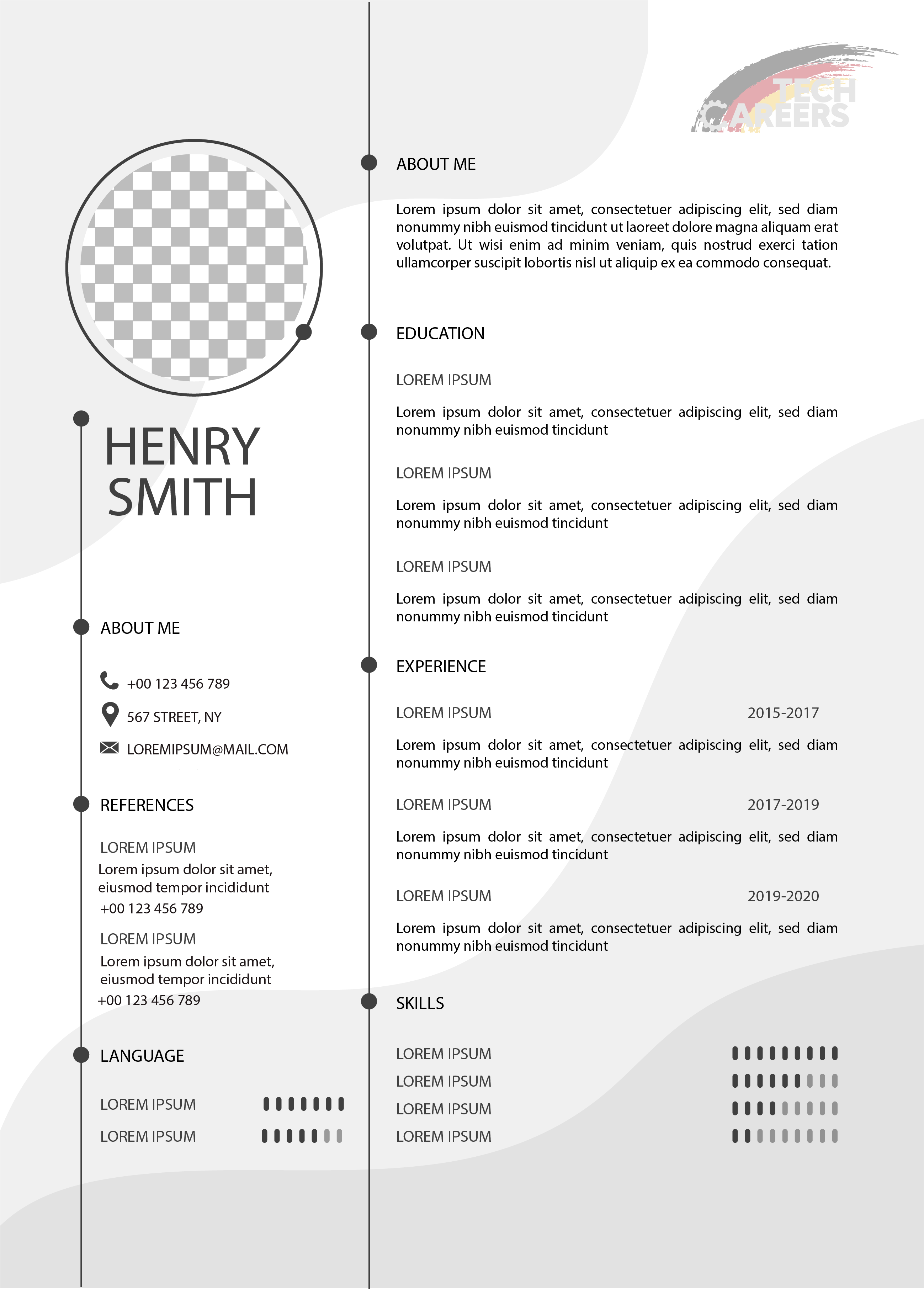
Applying for a job in Germany requires a well-crafted and strategically tailored German CV. Whether you’re pursuing tech jobs in Germany , or seeking a software engineer position in Berlin, knowing how to create a resume in the German CV format is essential to securing an interview. This comprehensive guide will walk you through the key aspects of a German CV, including format, structure, and how to make your CV stand out to potential employers. We will also provide tips for tailoring your CV to specific job applications, industries, and provide additional resources to ensure your success.
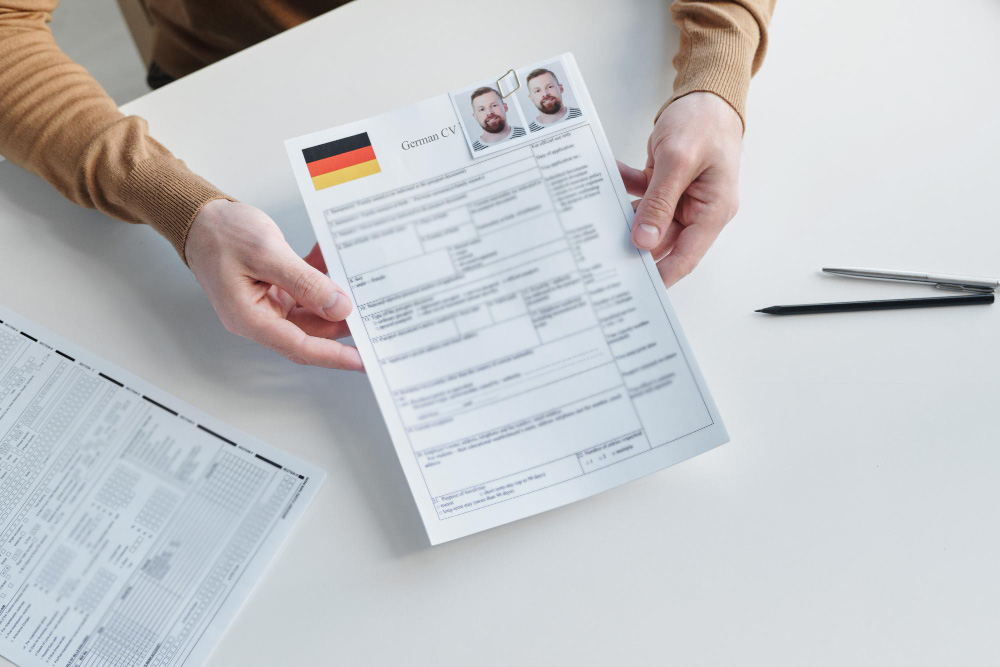
The German CV Format and Structure
When creating a German CV, it is important to adhere to the traditional German resume format, which consists of several key sections. Discover our step-by-step guide on how to make CV in German, ensuring you stand out to potential employers and increase your chances of landing your dream job in Germany. Here is an overview of each section:
- Personal Information (Persönliche Angaben): Include your full name, date of birth, address, phone number, and email address. A professional photo is also commonly included, though not mandatory.
- Education (Bildung): List your educational background, including the names of schools or universities, the degree earned, and the dates attended.
- Work Experience (Berufserfahrung): Present your work history in reverse chronological order, with your most recent position listed first. Include the company name, your job title, the dates of employment, and a brief description of your responsibilities.
- Skills (Fähigkeiten): Showcase your relevant skills, such as software proficiency, project management, or leadership abilities. Be specific and focus on skills that are directly related to the job you’re applying for.
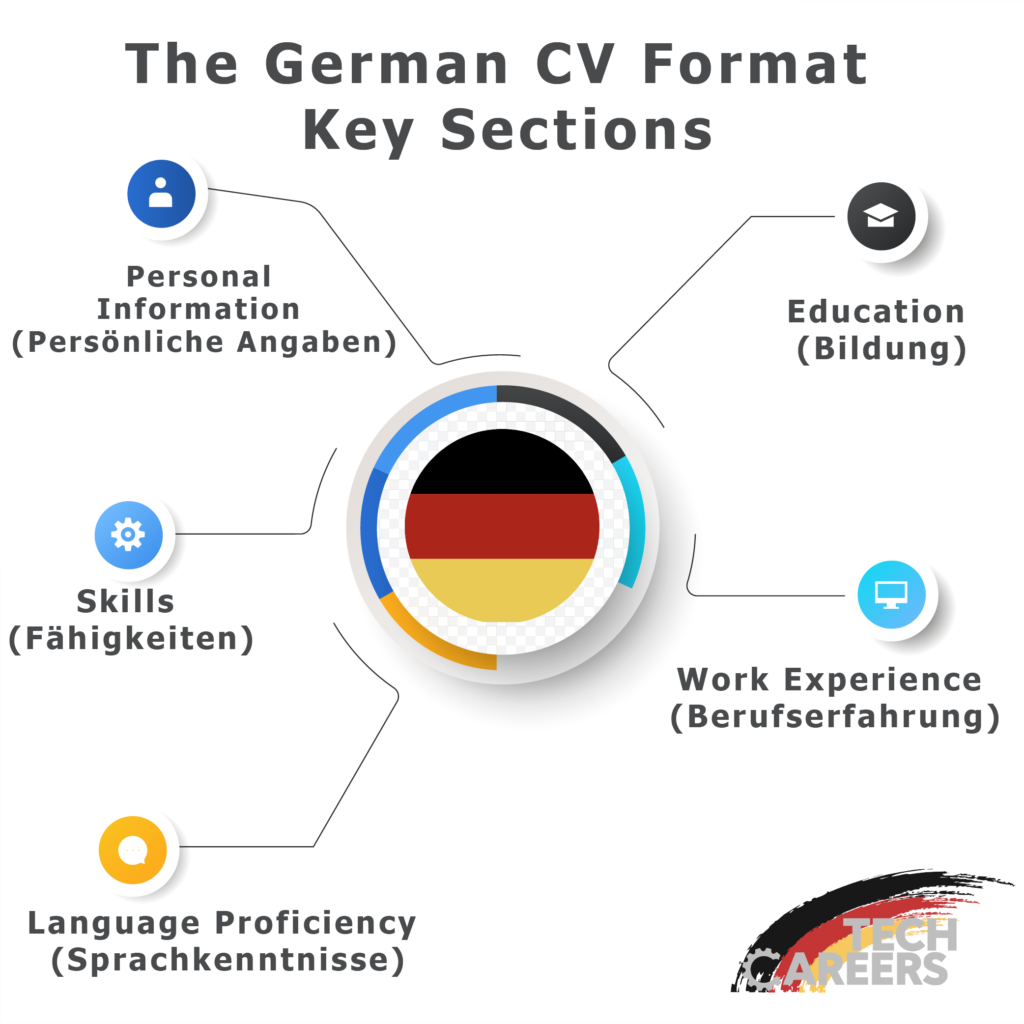
- Language Proficiency (Sprachkenntnisse): Indicate your language skills using the Common European Framework of Reference for Languages (CEFR) scale, which ranges from A1 (basic) to C2 (native). This is particularly important if you’re applying for jobs in Germany as a non-native German speaker.
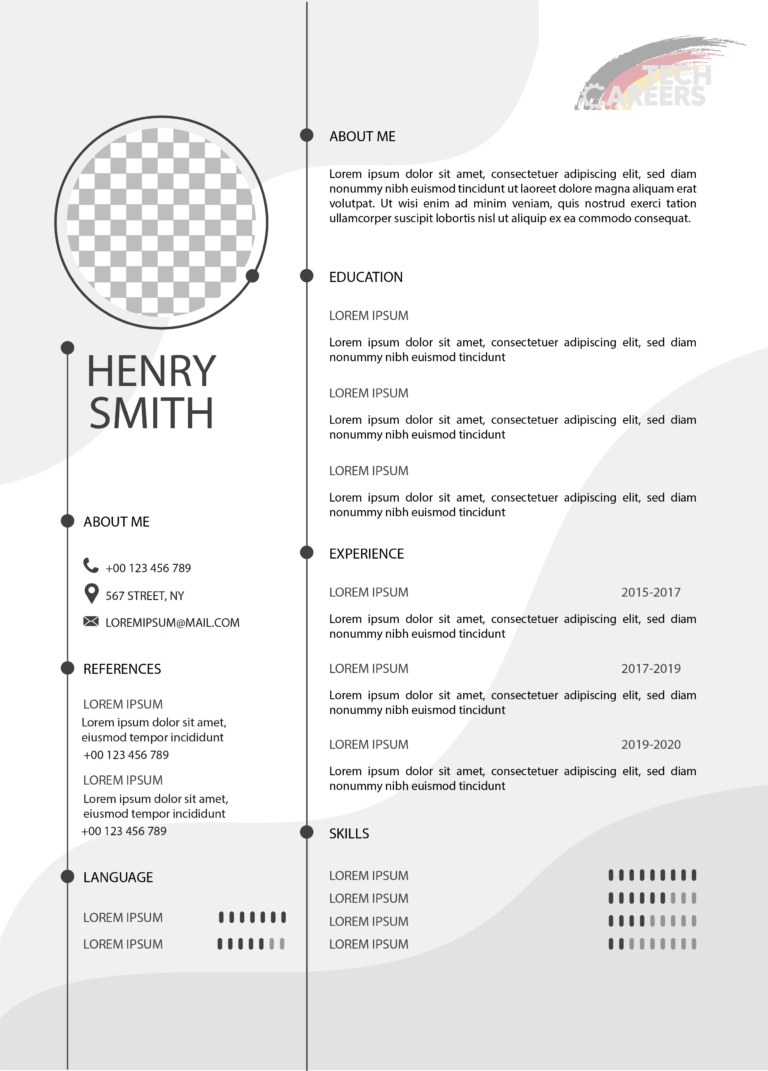
German CV Templates and Examples
To ensure your CV adheres to the German resume format in English, consider using a German CV template in English or a German resume template. These templates provide a solid foundation for building your CV, while also helping you avoid common mistakes.
For a more personalized touch, examine a German CV example in English or a German resume example. These samples can offer insights into the best practices for each section and inspire you to create a compelling resume that stands out.
Tailoring Your German CV to Specific Job Applications and Industries
To make your German CV even more effective, tailor it to the specific job and industry you’re targeting. Here are some tips for doing so:
- Highlight relevant experience: Emphasize the skills and experiences most relevant to the position you’re applying for. For example, if you’re applying for a software engineer position in Berlin, focus on showcasing your software development skills and past projects.
- Use industry-specific keywords: Incorporate relevant keywords and phrases from the job posting to demonstrate your familiarity with the industry and improve your CV’s visibility to hiring managers.
- Match the company culture: Research the company’s values, mission, and culture, and reflect these aspects in your CV. This will show your genuine interest in the organization and your compatibility with the company.

Additional Tips and Resources for Creating a Successful German CV
In addition to the tips above, consider these additional suggestions to ensure your German CV is a winning one:
- Language proficiency: If you’re a non-native German speaker, it’s essential to demonstrate your language proficiency, especially when applying for jobs in Germany. If you’re unsure of your level, consider taking a language proficiency test like the TestDaF or Goethe-Zertifikat.
- Avoid common mistakes: Double-check your CV for common errors such as grammar and spelling mistakes, inaccurate dates, or inconsistent formatting. These errors can undermine your professionalism and hurt your chances of securing an interview.
- Keep it concise: German CVs should be no more than two pages long. Be concise and focus on the most relevant information to the position you’re applying for.
- Use a clean and simple layout: A visually appealing CV is more likely to catch the attention of hiring managers. Use a clean, simple layout with clear headings and plenty of white space to make your CV easy to read.
- Include a cover letter: A well-written cover letter can complement your German CV by providing additional context about your skills and experiences, as well as your motivation for applying to the job.
- Get feedback: Ask friends, colleagues, or professional contacts to review your CV and provide constructive feedback. This will help you identify areas for improvement and ensure your CV is polished and error-free.
- Use online resources: There are numerous online resources available to help you create a successful German CV. Websites like Europass, Joblers, and Lebenslauf.com offer templates, examples, and guidance on crafting a CV that meets German standards.
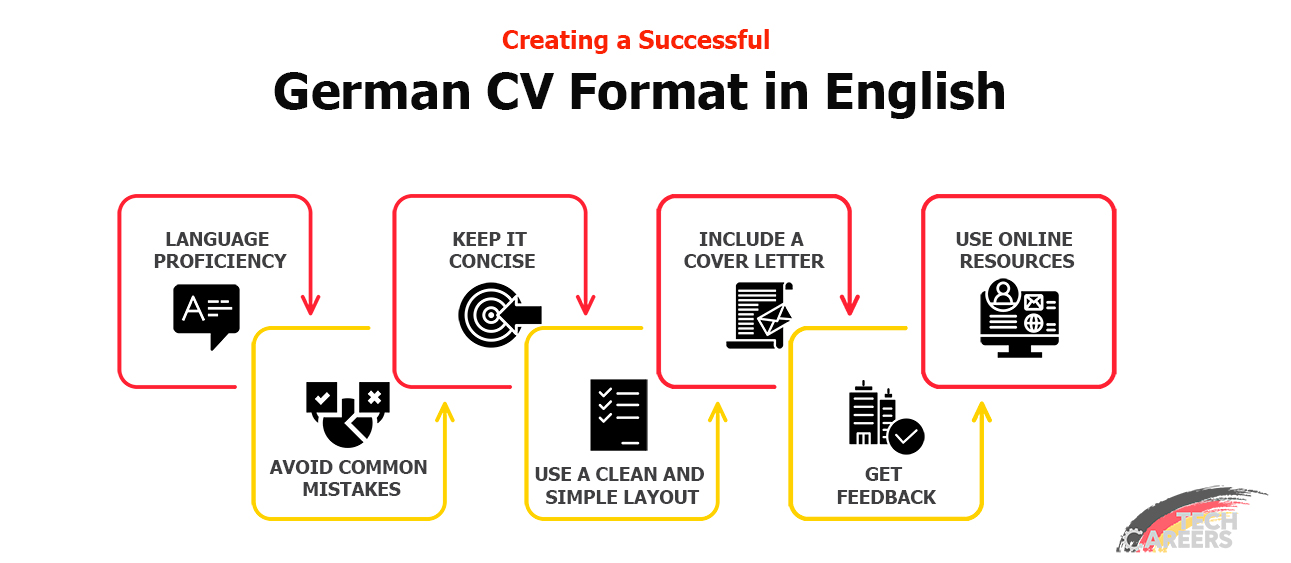
By following these tips and utilizing the resources available, you’ll be well on your way to creating a winning German CV that opens doors to exciting job opportunities in Germany. When considering a career move to Germany, it’s important to research the local job market, as the average software engineer salary Berlin is both competitive and attractive to professionals in the tech industry. ( Explore job opportunities in Berlin >>> ) Remember, the key to a successful CV is tailoring it to your target job and industry, highlighting your relevant skills and experiences, and adhering to the german CV format in english and structure. With time and effort, you’ll create a CV that stands out and makes a lasting impression on potential employers.
List Your Job Post on Tech-Careers.de!
Due to the stable traffic flow on our website, your vacancy will be visible to thousands of German tech professionals. Let the best IT candidates in Germany see your company's offer and become the perfect match for your needs!

Comments are closed.
DON'T WAIT, START TAKING ACTION NOW AND DISCOVER The Opportunities That Await You!
- IT Jobs in Berlin
- IT Jobs in Hamburg
- IT Jobs in Munich
- IT Jobs in Cologne
- IT Jobs in Frankfurt
- IT Jobs in Stuttgart
- IT Jobs in Düsseldorf
- IT Jobs in Leipzig
- IT Jobs in Dortmund
- IT Jobs in Essen
- IT Jobs in Bremen
- IT Jobs in Dresden
- IT Jobs in Hanover
- IT Jobs in Nuremberg
- IT Jobs in Duisburg
- IT Jobs in Bochum
- IT Jobs in Wuppertal
- IT Jobs in Bielefeld
- IT Jobs in Bonn
- IT Jobs in Münster

- Privacy Overview
- Strictly Necessary Cookies
This website uses cookies so that we can provide you with the best user experience possible. Cookie information is stored in your browser and performs functions such as recognising you when you return to our website and helping our team to understand which sections of the website you find most interesting and useful.
Strictly Necessary Cookie should be enabled at all times so that we can save your preferences for cookie settings.
If you disable this cookie, we will not be able to save your preferences. This means that every time you visit this website you will need to enable or disable cookies again.

How to write a resume in English for jobs in Germany
by Jakob Straub
Published on September 16, 2021 / Updated on January 9, 2024
Your resume or CV is the first impression you’ll convey to recruiters and hiring personnel. It’s crucial to write a strong resume to present yourself in the best possible way, especially when you want to apply in English for a job in Germany.
With companies looking for international candidates, there are no longer fundamental differences between an English and a German resume, but you still need to be aware of the details of the German CV format. We’ll offer tips on how to write a resume in English for job applications in Germany.
- The German CV format explained
- How to write a resume step by step
Write a strong resume as part of a successful application
Ready to start learning with lingoda, the german cv format explained.
German recruiters and companies expect a German-language resume, but there are exceptions, such as international positions and jobs that don’t require German language skills. To write a successful resume in English for such an opportunity, you can then follow the German format. But what are the differences exactly?
In the English-speaking world, especially in the US , a resume denotes a one-page summary of your work experience and relevant information, while a CV is longer and includes your academic background and more details.
The Germans typically use the words CV and resume interchangeably. In Germany, prepare a summary of one or two pages that is a mix between the two. Make your document easy to scan both with the eyes and automatically in electronic format by structuring the information and including relevant keywords—abilities, skills, expertise and values recruiters are looking for in regard to the position.
Academic CV in Germany
For academic, research, education or scientific positions, you’d send an academic CV, as well as for a grant, fellowship or doctoral programme. It should list your relevant achievements and experience, depending on your field, as well as any publications, awards, honours or affiliations.
The specific format will vary, but an academic CV is more detailed and can include your presentations at important conferences, research publications or teaching experience, as well as grants or even course work. You can also include notable references. A professor in your department can advise you on the specifics of an academic CV in your field.
How to write a narrative resume
A narrative resume tells the story of your career, job experience and professional development from a first- or third-person point of view. Though unorthodox, it can grab someone’s attention and highlight your branding and marketing skills as you’re selling yourself with catchy copy.
The advantage of this approach is a striking headline and full sentences which can include more keywords relevant to the job. You chart your career journey in brief paragraphs and describe your qualifications and experience in memorable sentences. On the downside, such a resume can still appear as a wall of text and recruiters might discard it before they’ve read through it. A narrative resume is therefore best for jobs where your creativity comes into play, that is, anything writing-related or positions related to art and design.
Format your CV with these sections
Depending on the position to which you’re applying, your resume or CV might highlight different things. But the following sections are mandatory and optional when you build your resume in English for a job in Germany.
Must-have sections for your resume:
- Personal information
- Work experience
Optional sections for your resume:
- CV summary, objective or mission statement at the beginning
- Certifications, awards, publications, grants, patents etc.
- Language skills
- Personal projects
- Volunteer work or other relevant experience
Learn more about how to write your CV in English .
How to Write a Resume Step by Step
We’ll go over the CV sections step by step to show you how to write a successful resume for English job applications in Germany.
Personal Information
- Name: Write out your first and last name and stick to the names by which people commonly call you.
- Title: Your professional title or the position for which you’re applying.
- Address: List your full address in international format, that is including your country if you’re applying from outside of Germany.
- Phone number: Same as above, include your country code.
- Email: Use a professional email address, but avoid using the one of your current job.
- Website / Social Media: This is flexible and depends on your experience or the job. For example, you can link your portfolio website, job portal profile, professional Twitter or blog.
- Photo: You don’t have to include a picture, but if you do, it should be a professional headshot.
It used to be common to include your birthday and marital status, but nowadays, it’s outdated; you can list your age if you think it highlights your expertise or job experience, but your marital status is private information.
Imagine a recruiter only scans your resume. If you include a brief statement at the beginning, you have a chance of making an impression while their attention is still fresh. You can do this with an objective or a summary in two or three sentences.
An objective describes your motivation and goal when applying for the job. It should highlight skills, education and anything else relevant to the position, as well as how you’ll apply yourself and what you bring to the table.
If you have extensive work experience, a summary is best, listing past jobs, relevant achievements and responsibility, important career stages and the professional growth you’re looking for.
Work Experience
This section is central to your resume and your key selling point. You’ll list your employment history in reverse chronological order, starting with the most recent position.
- Company, location, description
- Summary of responsibilities and achievements
- Employment timeline
To stand out, go beyond ticking off your responsibilities as they appeared in your contract. Highlight your achievements with numbers where possible, for example, a growth percentage or the number of sales. Learn more about how to build your CV with work experience.
To save valuable space, it’s good practise to tailor this section to the specific job. The description in the ad should tell you what the company is looking for, such as programming skills, technical knowledge or even certification. But you can also include so-called soft skills such as leadership, communication or management.
The section regarding your education can include:
- Degree or the name of the study programme
- Dates attended
- Optional: GPA, honours, academic achievements and your minor subject, if any
Optional Sections
Additional sections in your resume can help you stand out further in the application process:
- Certifications and awards: Include those relevant to the position or sector. If you have little work experience, you might include additional online courses.
- Language skills: Candidates who are at least bilingual stand out. When listing your language skills, categorise them as Native, Fluent, Proficient, Intermediate or Basic.
- Publications: A list of academic or professional publications.
- Personal projects: What you do on the side can boost your chances if it highlights your passion, dedication or experience.
- Volunteer work and experience: Only include those when they’re relevant and reflect positively on you!
Also check out our additional tips for writing the perfect CV !
Avoid a scattershot approach and don’t send out the same version of your resume for wildly different positions. Always tailor the information to the specific company and adjust your keywords and phrasing or restructure the information where necessary. Any recruiter will be put off by information that is not relevant to the role.
To write a successful resume, take extra care to eliminate errors and typos and get rid of fluff or embellishments. Use a consistent design with clear section headings, balance the white-space on the page with margins and line-space and pick a legible font scale. When you send or upload your resume without a cover letter , consider adding a brief statement at the top.
Are you ready to slay the job application process? Here’s how to find English-speaking jobs in Germany !

Jakob Straub
Jakob is a freelance writer in Barcelona, Spain, and his favorite books have pages all empty. As an expert storyteller, he publishes creative fiction in English and German and helps other authors shape their manuscripts into compelling stories. Thanks to an expertise in a wide range of topics such as writing, literature and productivity to marketing, travel, and technology, he produces engaging content for his clients. Apart from the escape that books offer, Jakob enjoys traveling digital nomad style and stays active with climbing and hiking. Find out more about him on his website or on Goodreads .

Dec 20, 2023
Experience life-changing language wins with Lingoda in 2024
As the year draws to a close and we prepare to welcome 2024, you might be setting up new goals...

Language wins: A student’s journey to her dream job in France
2024 is the year of language wins! We guide our students to conquer their language aspirations, transform their lives through...

Dec 19, 2023
A year in review: Lingoda’s Wrap-Up feature to highlight your language milestones
Every end of the year is a time to look back. As you reflect on your language learning achievements, let...
Level up your language skills with Lingoda. Take our placement test for free and get started.

Germany CV Tips & Format Requirements
Applying for a job in Germany? This guide has the tips, examples, & format requirements needed to write the perfect German CV. Create your VisualCV today!
Germany CV Requirements
Germany has a very specific work culture and set of CV expectations that must be observed when writing your CV. This guide will set out some guidelines for writing your CV, but if possible, having a German local look over your CV is a great way to get some feedback on your German CV and make sure it meets all requirements.
Browse our gallery of resume examples here.
What should a German CV look like?
The example below shows what a good German CV should look like.
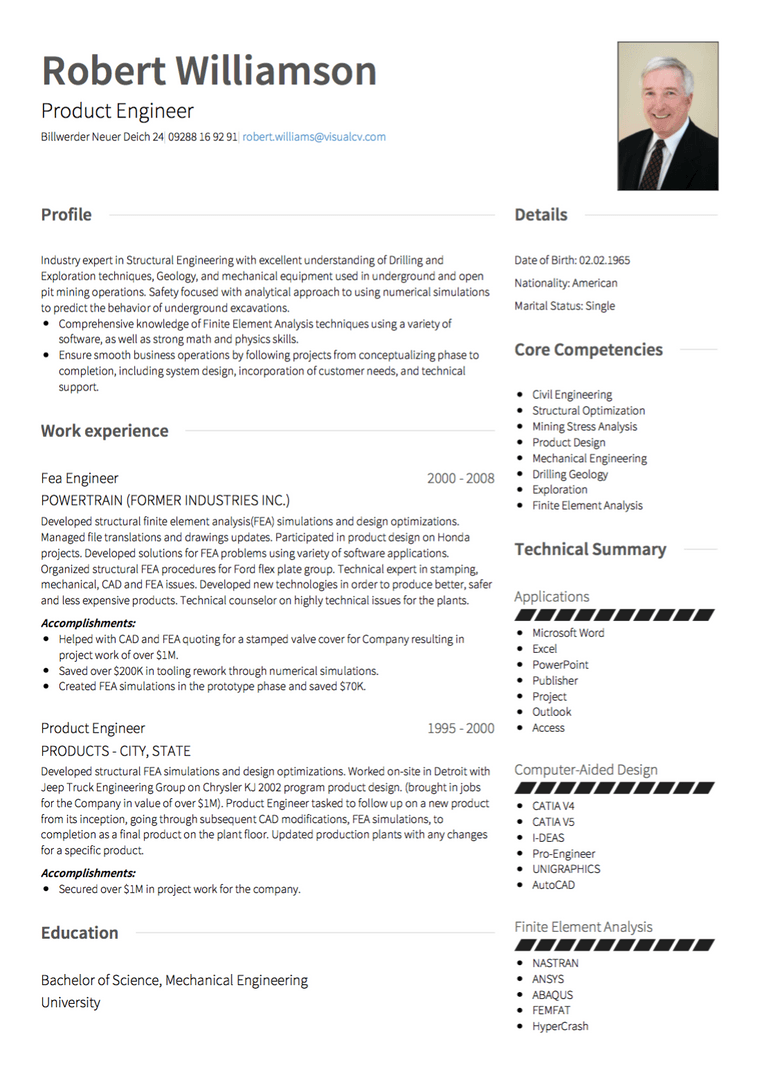
CV Tips and rules:
Length: A German CV does not need to be longer than two pages.
Terminology: In Germany, a CV is called a Lebenslauf. CV Format, Order and Layout:
Photo: Be sure to include a photo on your German CV. German recruiters and employers value professionalism, so make sure your photo is high-quality and work appropriate.
Personal Information: Near the top of your CV, include your name, home address, phone number, email address, and date of birth. Often failing to state your age on your CV is considered bad in Germany as hiring managers might perceieve your CV as incomplete without it.
You can also include your place of birth, marital status, and number of children (if any). To non-Germans, this may seem like a lot of information, but in Germany including it in your resume is common.
Personal Summary: Called a Profil, a summary section can be included in your German CV. This section should briefly describe your skills, experience, and credentials. It is not a detailed section, but serves to introduce the rest of the CV.
Education: Education should be written in reverse-chronological order, going all the way back to high school. Each entry should include the name of the institution and the area of study.
Work experience: Display your work history in reverse-chronological order. Include the dates and location of each position, and be clear about the industry and specific position you held. Use strong, active language, and use bullet points to make your different achievements easy to read and differentiate. Account for any employment gaps.
Resume template: Browse through our gallery of German resume templates .
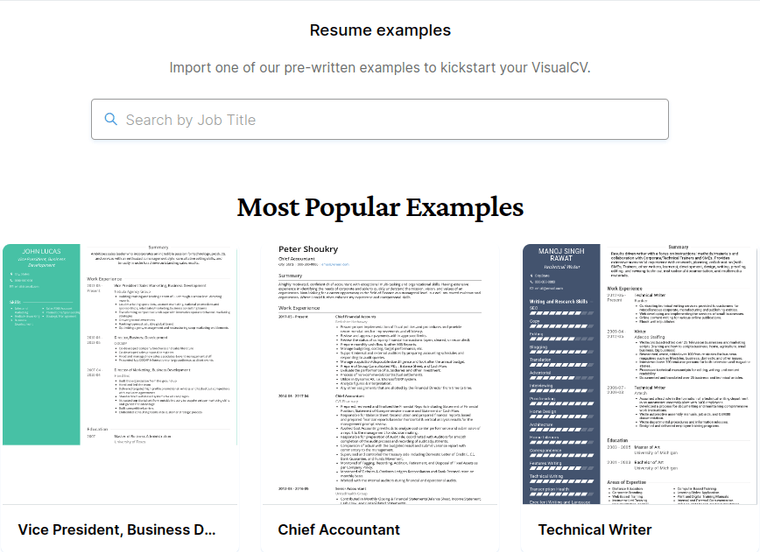
German CV Templates and Formats
German cv template.
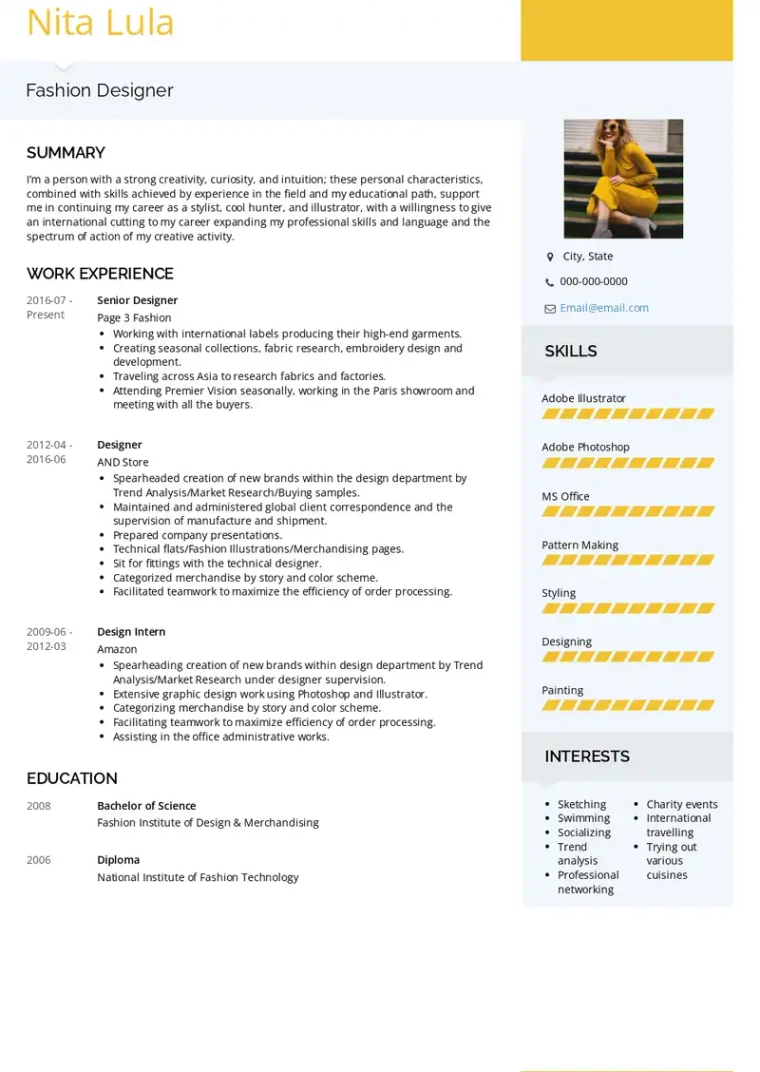
German CV Format for Engineer
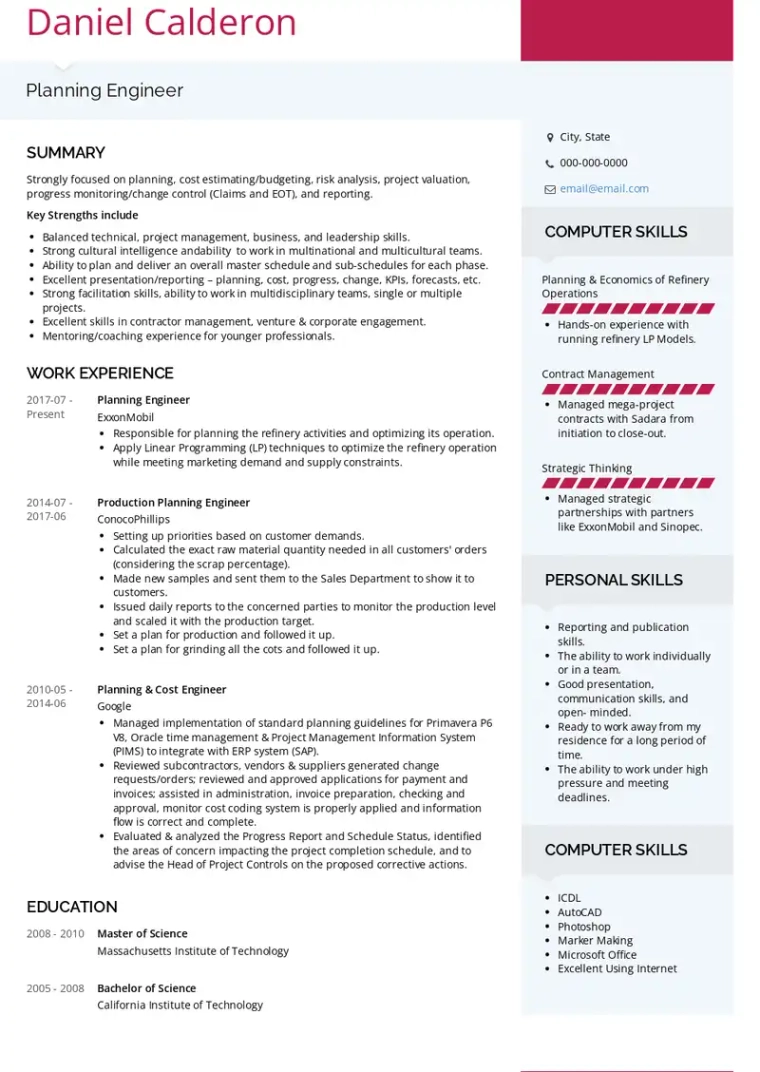
Business German CV Template
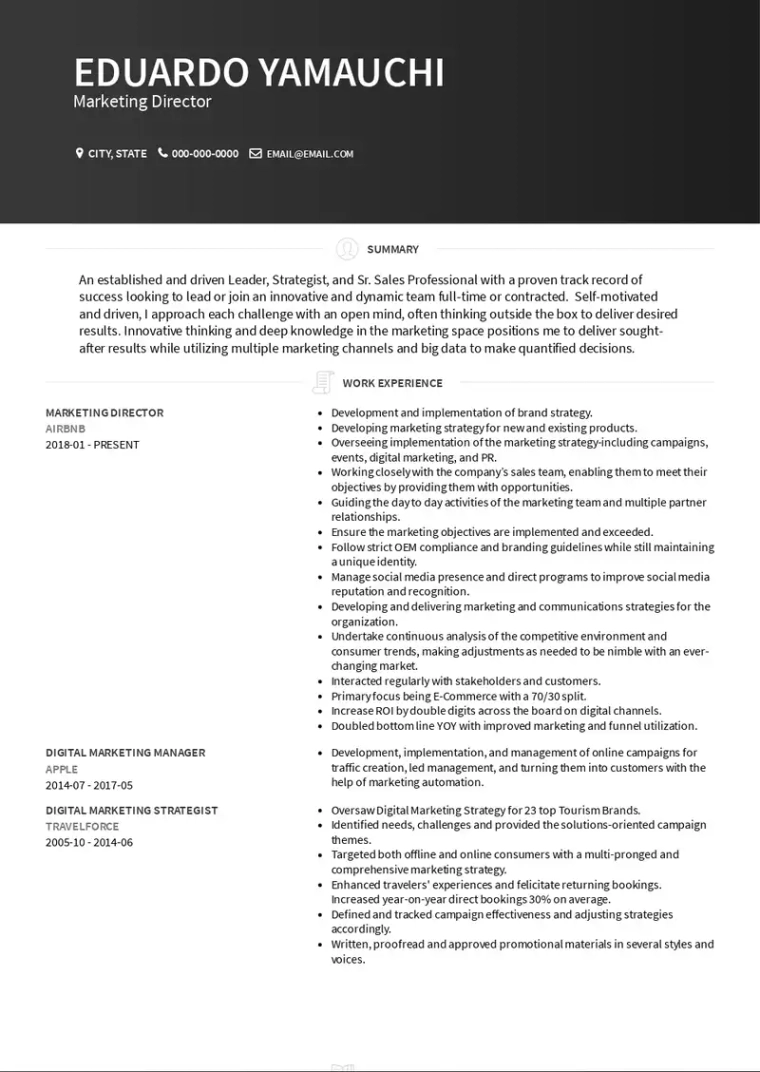
Administration German CV Format
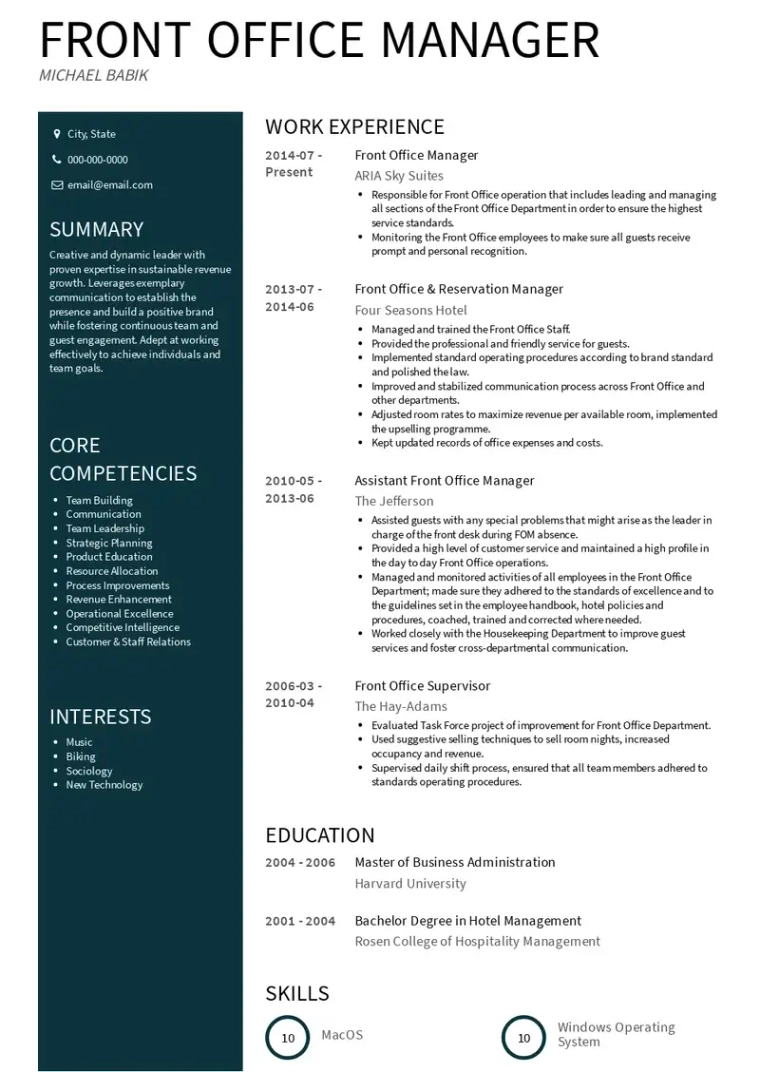
Other CV sections:
Skills: Though not mandatory, it is illustrative to include a skills section that any certifications earned out of school or language proficiencies.
Volunteer experience: This section is optional, but if you think your Volunteer section is an asset including it is a good idea.
References: In Germany, it is not common to include contact details of references in your resume. Instead, written references are preferred. These written references, referred to as “Arbeitszeugnis” are given to each employee once they are relieved from their duties.
What should be on a German CV?
The following is expected to be present on all German CVs:
- Personal Information
- Personal Summary
- Work experience
How long is a German CV?
German CVs are not more than 2 pages long. Anything longer than that is considered too long and risks getting rejected by the hiring managers.
Conclusion:
German recruiters and employers value a well-organized and detailed CV that is clear and direct about your experiences and skill set. Ensuring that you have the right information packaged in the right way can be the difference between a call back and a resume tossed away.
Copyright © 2024 VisualCV

Select Your Language :
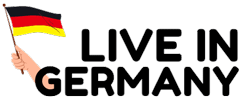
German CV Tips + Template [Detailed Guide 2024]
by Live in Germany Team | Work in Germany
Last Update: Feb 24, 2024 @ 6:44 am
🚀 Meet LiGa, our cutting-edge chat bot for all things about living in Germany! 🇩🇪 Personalized and interactive, LiGa outshines traditional searches. It’s in beta phase, and your feedback will shape LiGa into the ultimate companion for your inquiries! 🤖✨ #LiveinGermany

Want to write a German CV ( Lebenslauf ) in English?
CVs in Germany are straightforward, which can be helpful if you want to avoid coming across as self-promoting or business jargon-heavy.
They also make a good impression when sent unsolicited, as they leave little room for misinterpretation. However, as with any document, it is always best to tailor your German CV according to the specific needs of each job application you submit.
Personal Information
We recommend including your essential information like name, address, contact information, and previous designations in the personal information section because German recruiters expect to know more about you!
Profile photo – The Germans will judge your professionalism by considering your profile picture. So make sure that the picture is professional but not too formal.
Have a long name? – It is advisable to use the first name you want to be called and the last name when registering for a German job, and this thing will reduce the confusion on the employer's side as to what name should be called.
Phone number – If you're using a German number, add it to your CV. Otherwise, consider adding your skype ID.
Nationality – If the employer can verify that you are a citizen or national of the country in question, they may not need to apply for a work visa.
Work Experience
Hobbies & interests (optional), courses and certificates, how german cv is different from english cv .
- Without picture – There is no specific etiquette for attaching a picture to a CV in English, but required in German CV.
- CV order – CV data is always in reverse chronological order. This is the opposite of how German CVs are structured, i.e., the CV begins with professional experience and vocational training.
- Personal data – No personal data should not be missing from a CV, as this would violate local legal requirements. In addition, information on marital status, age, religion, or origin should not be included in an English Language CV.
- References – In Germany, references are not very common in a CV but are mandatory in an English CV.
- An English CV will typically lack a date, whereas German CVs will usually include one. Additionally, German CVs usually feature a signature at the bottom.
- Cover Letter: A cover letter should include only the most relevant information regarding job requirements in error-free English.
6 General CV Tips for Germany
- Keywords and Experience: Write important information first, use keywords relevant to your field and experience, and customize them to each vacancy.
- Short Objective: Objectives tend to be generic and focus on yourself. Recruiters would rather see what you can provide for the company. Hence, starting with a summary is more effective than an objective.
- Length doesn't Matter: A German CV does not need to be shorter than one and longer than two pages.
- Limit Font and Color Choices: We recommend staying within a few select font types, sizes, and colors when designing your Europass CV, and this will help keep the design consistent and professional-looking. Using a custom-designed template is always better than using an existing Europass site!
- Relavent Experience: If you are applying for a position in finance, then include your experience with Excel and financial modeling. If you are applying for a position in marketing, then include examples of your creative work and how you developed target markets. Each application requires different information, so tailor your CV specifically to the job opening.
- Short and Focused: It is recommended not to include all your experience, skill, and qualifications – keep it to the point by only listing those relevant to the job role.
📢 Important Note: As much as we love sharing insights, it’s crucial to clarify that we’re not experts – just enthusiasts eager to help! 🤓💼 Our recommendations, including any affiliate links, stem from personal experiences, not professional endorsements.
Before taking any steps based on our suggestions, we highly recommend conducting your own thorough research. 🕵️♂️📚 Your unique needs and circumstances deserve tailored attention, and we’re here to support you in making informed decisions. Thanks for entrusting us as part of your journey! 🌟🙏

If you’ve found our content super helpful, we’d be over the moon if you could show some love and support our website! 🚀💙 Just a little click right here 👉 and you’ll be magically whisked away to our support page. 🪄 Your support means the world to us and helps keep the expat community thriving with valuable info about life in Germany. 🌍🇩🇪
Join Our AI-Enhanced Expat Community in Germany!
Embark on your German expat journey with an edge! Our exclusive Facebook group offers a unique blend of human connection and AI-driven insights.
Why Join Us?
- AI-Powered Support : Get quick, accurate answers to your life-in-Germany queries through our advanced AI chatbot.
- Global Expat Network : Share experiences, seek advice, and make friends with expats from all around the world.
- Spam-Free, Friendly Space : Enjoy a respectful, safe environment. Unsubscribe anytime you wish.
Be part of a community where AI complements human experiences.
If you don't find the Email, then kindly check your SPAM mail. Thank you
Discover Life in Germany with AI Smarts & Expat Hearts!
Join our exclusive Facebook group for expats, enhanced with AI chatbot support. It's where insights meet intelligence!
AI Chatbot Expertise : Fast, reliable answers on living in Germany.
Vibrant Expat Community : Connect, share, and learn with global expats.
Zero Spam, All Support : A safe, welcoming space, opt-out anytime.
Ready for a smarter expat experience? Sign up for our newsletter and join the community!
If you don't find the Email, then kindly check your SPAM mail. Thank you

How to Write a German CV? Free Template, Example Word / Docx, Tips.
Stay calm. Creating a German CV is not atomic physics science. You must know that every country has its own preferences when it comes to structure and content in the CV. German HR departments expect that your CV will be Short and Simple. Recruiters usually 7 to 12 seconds read a CV to check if a candidate matches the job requirements. It's not a joke. A few seconds have an impact on Your job career. If you are not applying for a specialized job position, you only need to prepare a 1-page A4 resume with the most important information relating to the job offer.
When writing a German resume, be specific (this rule also applies to writing resumes in other languages) . After all, you know what the content of the job offer was. What skills and experience the employer expects from the candidate. Match the document to the job offer, use similar phrases that are in the job offer. As I wrote before, every recruiter is busy. Once the employer gets the document in hand, he wants to find a suitable candidate. Will the job applicant go to the next stage of recruitment? This will be determined by the quality of the information provided in the CV that attracted the interest of the German employer.
The German labor market is faced with a labor shortage, it would seem that there is a shortage of people willing to work, nothing could be more wrong, people want to work, the only problem is inadequate competences of candidates for a given job. You are responding to a job offer, show the employer that you are not a random candidate, match your resume to the offer, write in a professional summary (in German: "Kurzprofil") about your strongest skills, use keywords like those used in the job offer.
Write your CV – so that it fits the German standard!

We have prepared a few tips. How to write/create an effective CV. Ready examples. So we start.
TIP 1: Design
When building Your CV, it is important to design it in a way that appears attractive to the employer/recruiter – make your CV easy to read. I've already written about it 7-12 seconds this is time to analyze your CV. Remember that your CV is your business card which supposed to show off your experience, skills and education. Use the 11-12 font size, don't get crazy with a coloured text or italic fonts. Remember - a simple and readable document! Length of the German CV? There used to be one page CV, currently, it can be up to two or three pages, but only if you describe that many important tasks and skills.
Preparation of documents does not have to be difficult. Use the free examples of the German CV (document templates below).
TIP 2: Structure / Format
- Personal details (Persönliche Daten).
- Career Summary (Kurzprofil) - Optional .
- Work Experience (Berufserfahrung).
- Education (Ausbildung).
- Skills (Kenntnisse und Fähigkeiten).
- Interests & hobbies (Interessen und hobbys).
TIP 3: Content
The recruiter is not interested in information that your first job took place in a plant nursery (unless you apply as a gardener) and nobody wants to know that you worked as a waiter at every weekend during your studies (unless you are applying for a job in gastronomy). Never add to a CV all the details of your work history. Just include information that might be useful for the profession and that shows skills, expertise which may add value to your potential employer.
TIP 4: Personal details (Persönliche Daten)
How to write a German CV? Tips - Personal details.
Add to your CV all necessary personal details that might help the recruiter to contact you and to understand who you are.
Your Photo in the CV. A professional photo in your CV should have good quality and business format. You do not have such a photo? Maybe you should use the services of a professional photographer. Optional - but this element can help us recruit . Don't make this mistake - don't include your holiday or party photos.
Name and Surname. First and last name add to the CV, use a bold and larger font size for this purpose.
Phone, Email address. Your sim card to the mobile phone was purchased in Germany? If not? Remember to add the country code (area code) before the phone number.
Address. Place of residence.
Age/Birth date. It is worth giving the date of birth to facilitate work for the recruiter. Optional - but it helps to get a full picture of the candidate .
Citizenship. This is important information to the employer whether the candidate needs a visa or work permit in Germany.
Marital Status and number of children. Optional - but it helps to get a full picture of the candidate .
TIP 5: Career Summary (Kurzprofil)
How to write an effective German CV? Tips - Career Summary.
This is a summary paragraph of two to four lines in size, which is listed at the beginning of the german CV before the presentation of the work experience.
Voluntary: Of course there is no obligation to add a Career Summary for the German CV. Experienced managers and qualified specialists can give an overview of their individual career strengths, goals and experiences with a short profile.
- Would you like to highlight your industry experience?
- Would you like to prove your action strength?
- Would you like to demonstrate your ability to innovate and your creativity?
TIP 6: Work Experience (Berufserfahrung)
How to write a professional German CV? Tips - Work Experience.
Include the work history in reverse chronological order. Add your most recent job first on the top of the section. Include the name of the company, the dates you worked for them (eg. 07/2016 - 05/2019) and also add the city (company location).
Add your position, examples: "Senior Java programmer" or ""Junior PHP programmer"" or "Graphic designer " or "Cook" etc.
Mention your responsibilities and achievements that are relevant for the job you are applying for. Use bullet points to show 4 to 8 of your most important tasks.
TIP 7: Education (Ausbildung)
How to write a perfect German CV? Tips - Education.
Same as before, add the education in reverse chronological order. Keep in mind to include names university, schools as well as the date you attended school. Attach information about acquired professional titles and diplomas.
TIP 8: Languages (Sprachen)
Include reality foreign language skills. To determine the level of knowledge languages use the scale of the Council of Europe. Examples: "English - C2", "Chinese - B1", "Spanish - B2".
TIP 9: Skills (Kenntnisse und Fähigkeiten)
Did you have training that is relevant to the profession applied for? Mention it here.
Here you can determine computer skills and programs, example: "MS Excel (advanced level, knowledge of macros and pivot tables)". Next example: "Excellent knowledge of the Y tool allowed me to reduce costs by X".
TIP 10: The correct format of application documents.
After writing, save the CV and cover letter to PDF format. You will be sure that the employer will correctly read your application documents.
# Free Example 01 (editable in MS Word 2013)
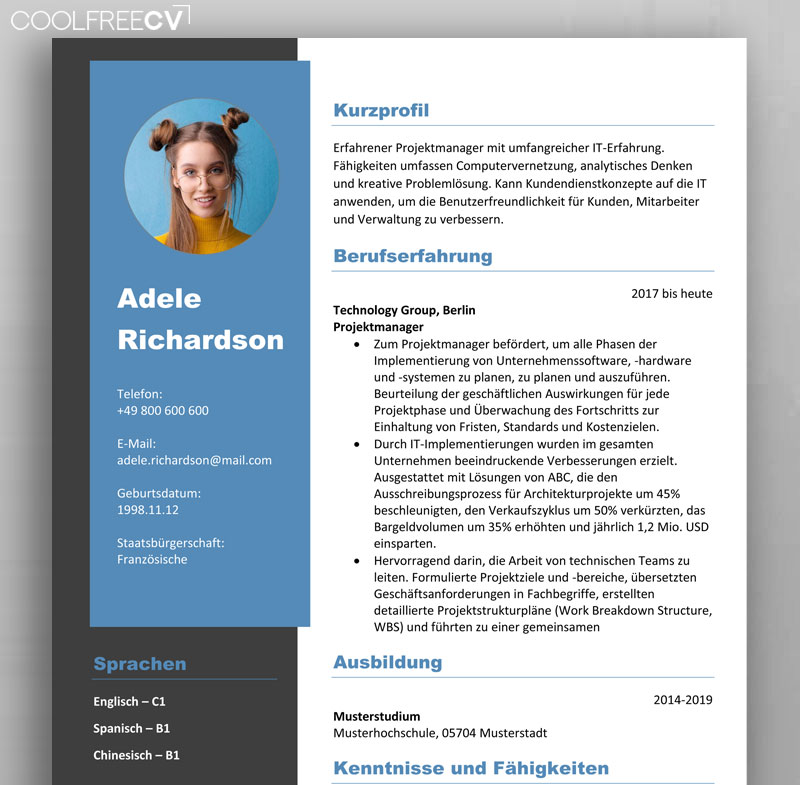
German CV Example (Format Microsoft Docx / Word / Free) download
# Free Template 02 (editable in MS Word 2013)
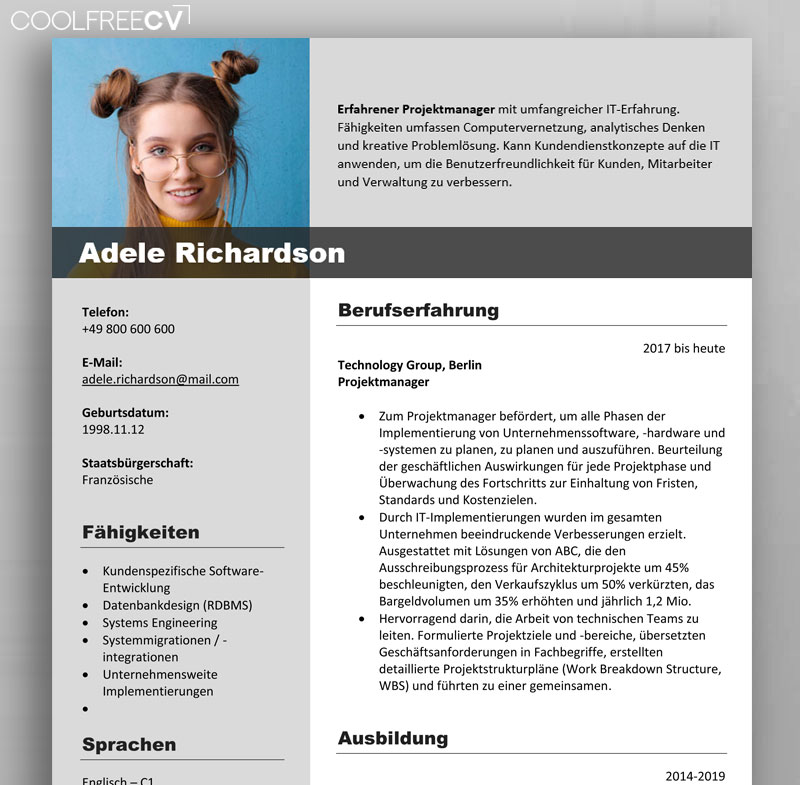
German CV Template (Format Microsoft Word / Docx / Free) download
Germany is the largest and strongest economy in the European Union. The size of the economy translates into a large number of job opportunities. The large number of vacancies and good salaries cause many residents from different countries, not only those in the European Union, to emigrate to Germany for work. German companies are having great difficulty finding qualified workers. On economic websites, one can find out that the shortage of skilled labor oscillates between 500,000 and 600,000. This is the number of unfilled jobs. These are mainly professions in which high qualifications are required.
According to recent calculations, the shortage of skilled workers is having a negative impact on the entire German labor market. Large shortages are in the areas of health and care, social services, education, and everything related to construction technology. The shortages are huge, for example, just the area of health alone lacked suitably qualified people for more than half of the available vacancies.
Labor shortages are hitting the resource extraction sector hard, as well as manufacturing, information technology, and there are also shortages in agriculture, animal husbandry and horticulture and forestry. In recent months, the number of job openings for qualified people for positions related to energy technology as well as aviation has increased strongly. Germany is no exception here, similar pains are affecting other strong European economies including the UK.
- How to Write a Cover Letter
- How to Write a Resume with No Work Experience
- How to prepare for a recruitment interview
- Swiss German CV Template
- Professional CV / Resume Tips
- Skills section in CV
- Resume Icon Free

How to write a CV for a German University: A Guide for International Students (2023)
- Do universities require CVs?
- How important is the CV?
- How do I write a CV?
- Different types of the CV
- Top mistakes
Video Course
Get Accepted into Your Dream German University — with the Perfect Letter of Motivation!

Let us make a guess: if you are reading this article, that means that you have already found out that one of the key documents that you would need for applying to a German university is the CV. If you did not know that, now you know!
The purpose of this article is to provide clear answers to the most crucial questions about the CV-writing process with regard to the German university context. We know that writing a CV for a German university is one of the most (if not the most) challenging application tasks for students. That is why we decided to make your life easier and put the answers to the central questions in one place.
The basics that you need to know about CVs for Germany

What is a CV for German universities?
Generally speaking, a Curriculum Vitae (CV) - known as Lebenslauf in German - is a (mandatory) application document requested by most German universities , where you should provide information regarding your academic background, work experience (including internships), extracurricular activities and skills in a concise and structured way. To put it differently, CV is your short biography, and it is through the CV that you can make a good first impression on the admissions officer, which might be crucial for your successful application to a German university. That is why writing a very good CV according to German standards is important, and that is why you should take the CV-writing seriously.
CV vs Curriculum Vitae vs Resume vs Lebenslauf - What are the differences?
Do not be confused or surprised if, while surfing through the different study programs listed in our StudyFinder , you find out that some of them do not mention "CV" but instead use terms like "Curriculum Vitae", "Resume", or "Personal Data Sheet". Usually, German universities use these terms interchangeably - so do not worry about that! Depending on the cultural and linguistic background of the people that administer the given study program, they will use one of the following expressions for what is called in German "Lebenslauf". It is noteworthy that in Germany, you will come across "CV" more frequently than "Resume".
Table 1: Different wordings used for "CV"
Do German universities require CVs?

Yes, German universities do generally require CVs for applications! According to our research, around 90% of Bachelor's and Master's programs in Germany require you to submit a CV in order to be considered as a candidate. This includes both English-taught and German-taught study programs. And again, do not forget various wordings that you might come across! Let's have a look at some examples.
CV for Master's in Software Engineering offered by the University of Potsdam .
Curriculum Vitae for Bachelor's in International Business offered by the Technical University of Applied Sciences Nürnberg .
Resume for Master's in Functional Materials offered by the University of Marburg .
Personal Data Sheet for Master's in Molecular Medicine offered by the University of Göttingen .
How important is the CV for German universities?

You might be wondering now how vital this document might be for your German university application, and you are on the right track if you are asking this question! In fact, a CV is usually the first thing out of numerous application documents that German universities check. Therefore, it is crucial in terms of making the first impression .
Interestingly, unlike the cases of the Grade Point Average or the Letter of Motivation (LOM) , German study programs do not assign any specific weight to the CV. Instead, a CV serves more like a "pass/fail" test. In particular, depending on the quality of your CV, you can either just retain the "status-quo" or make things worse. Put differently, with a high-quality CV, you can make a good first impression on the examiners, which will keep you in the competition for a place in the program. However, if your CV is of low quality, the admissions officers will have a bad first impression, which might even cause your application to be rejected . Hence, although a good CV will not strengthen your application as much as the LOM can, it is still crucial as a CV that meets high German standards will keep your chances for a successful application to a German university alive.
In a nutshell, you should invest enough time in writing a CV if you want to keep your German university acceptance chances high!
Geeky Stuff Box
Based on the study conducted by Stepstone , 91% of talent acquisition officers perceive a CV as the most important application document.
How do I write a CV for a German university application?
When writing a CV for a German university application, the first thing you should do is check whether your chosen program has any specific guidelines or requirements in this regard. In case it has, you have to follow them - that is the priority. However, it happens quite often that the universities and study programs do not specify what they are expecting from your CV. The good news is that it is not a problem at all! Why? Because in Germany, there are standardized expectations with regard to the CV content, format and structure, which you can always follow without any worries! Let us present to you these standards through the seven frequent questions that we get at MyGermanUniversity.
1. What do German universities look for in a CV?
In your CV, German universities look for an answer (at least partial) to the question of whether your background, interests and skills fit the expectations of the German Bachelor's or Master's study program you are applying for. Usually, the key information that the German admissions officers look for in your CV for a German university is the details about your education and work experience.
2. What should a German CV look like?
The question of "what should a German CV look like" can be reformulated as "what is the structure of the German CV" . Basically, your German CV should consist of four core sections, which are:
Header . In this section, you should provide your personal details, like your first and last names, physical and email addresses, phone number, etc.
Education . This is THE most important section of your CV for a German university application. Here you should provide information regarding your academic background. For example, it can be a high school diploma and a Bachelor's degree. Among others, you should include the date when you attended the school/university, the names of the institutions, location, etc.
Work Experience . This part should encompass information regarding your professional experience, including internships and volunteerships. And again, you should specify the dates, the location, names of the organizations/institutions, your position, etc.
The Rest . This is a broad section, which you can break down into several parts. For instance, if applicable, it should include the parts on extracurricular activities (e.g., workshops, summer schools, etc.), scholarships and awards, memberships (e.g., in case you are a member of any societies or clubs), skills (e.g., language skills, digital skills) and hobbies .
3. What is the CV format for German university applications?
When it comes to the formats of German resumes, you might often hear the following words: Tabellarische, Lückenloser Lebenslauf . This can be translated as "Tabular CV without gaps". These are one of the main requirements with respect to the German CV format. Other popular CV format-related requirements are reverse chronology and using the same script . So, what does each of these mean?
Let's start with the first word " Tabular ". To put it shortly, when German universities ask you to provide a CV in tabular form, they mean that you should have the CV structured like in table format rather than a narrative. Besides, the dates (of academic or professional experiences, winter schools etc.) should be on the left-hand side, while the titles and descriptions on the right-hand side.
As for " without gaps ", let us provide you with the following example. For instance, if in your German CV you state that you completed your Bachelor's in 2016, and then there are no more entries in any section until 2019 when you started working in company "X", it means that you have around a 3-year gap in your CV. This is something that admissions officers of the German university you applied to will not like. In other words, by having an unexplained gap, the quality of your German CV will be worsened. Consequently, you should try your best to avoid causing this kind of confusion and not leave any gaps in your CV.
Another important requirement of the German CV format is reverse chronology . This means that you should start with the most recent experience instead of the oldest. For instance, you should first mention your Bachelor's degree and then your high school diploma.
Last but not least, you should use the same script type throughout your German CV, preferably a standard script like Times New Roman or Arial. The font size can be 11-12pt for general text and 14-16pt for headers/titles.
4. Should I use Europass CV for German universities?
If the German university or the German study program does not explicitly ask you to use the Europass CV, you should not do that, as Europass is not a very commonly used format in Germany . In fact, most German universities prefer the German-style CV over the Europass CV. When you find out in the application requirements that your desired German study program asks you to submit the CV without specifying the format, it automatically means that the admissions officers expect you to submit the standard German CV.
Only rarely will you find a German university asking for the Europass CV. Below are some examples of those German universities and study programs that are fine with or even require a Europass CV.
Table 2: German universities and Europass CV
5. Does a German CV require a photo?
Yes, German universities usually require you to have your photo in the CV. The headshot should be professional, LinkedIn-style. In general, a photo in a CV for any purpose is a standard in Germany . So, even if the German study program that you are applying to does not mention that you need a photo in your CV, you still need to include the headshot. The only case where your CV should be without a photo is when the German university explicitly asks for that, which happens quite rarely.
Here are some examples of some German universities and programs which do not specifically request a photo in your CV:
Table 3: German universities and CV Photo
6. How long should the German CV be?
Your German CV should be neither too short nor too long. In general, German universities and study programs expect your CV to be 1-2 pages long . Put differently, ideally, your German CV should not be less than 1 page or more than 2 pages.
And again: this is a standard "formula" which you should follow unless your desired German university/study program has different requirements. For instance, the Master's program in Software Engineering for Industrial Applications offered by the Hof University of Applied Sciences will be fine with you sending in a 3-page long CV.
7. Is signature required in a German CV?
According to German standards, a signature is generally required in your German CV . Although most of the programs do not render that explicit, unless specifically mentioned otherwise, you should always sign your CV for the German university application. Some of the German study programs, such as M.Sc. Intelligent Systems at Ulm University of Applied Sciences , M.A./M.Sc. Mind and Brain at Humboldt-Universität zu Berlin etc., specifically put an emphasis on this requirement.
Your application to a German university might get rejected if your CV is inconsistent or incomplete.
Guidelines provided by German Universities and Organizations

In general, German universities and organizations do not provide any specific guidelines for writing your CV. In fact, sometimes, it can seem impossible to find any. But do not worry - we have your back! Our team managed to find some guidelines for writing a German CV provided by various German universities and organizations. You can explore them in the tables below.
Table 4: CV Guidelines from German Universities
Table 5: CV Guidelines by German Organizations

Further Reading
Different CVs in the German University context
If you decide to study in Germany, you will find out that you will most probably need your CV for more than just a German university application. Let us provide you with a brief overview of potential German CV "destinations" that might be relevant for you.
CV for Master’s in Germany
If you are going to pursue a Master's degree in Germany, then you will (almost) definitely need to submit a CV for your Master's application. The reason is that it is required for most of the Master's programs at German universities. Hence, the question that you might have right now is "How do I write a CV for Master’s in Germany?" The good news is that the information that we provide you in this article comprehensively and clearly answers the mentioned question.
CV for Bachelor's in Germany
If you’re not yet ready for a Master’s in Germany and you want to do your Bachelor's in Germany instead, then a resume is still quite relevant for you. Why? Because around 90% of Bachelor's programs in Germany do enlist this document as a standard requirement. And again, the given article is completely relevant for you in terms of preparing you for writing a very good German CV.
CV for DAAD scholarship
In case you are planning to come and study in Germany with a DAAD scholarship , you will need to prepare a separate application package, which also includes a CV.
Depending on the DAAD program you want to apply to, there might be some slight differences with regard to CV requirements. For example, the EPOS program specifically asks for the Europass format, while the Study Scholarships - Master Studies for All Academic Disciplines program does not.
By the way, the CV for DAAD should also be in tabular form. For more information about a resume for a DAAD scholarship, check out our article .
CV for other German scholarships
In fact, there are numerous ways of getting a scholarship to study in Germany! Here you can find some of the most popular ones (e.g., the 13 German public scholarship foundations or "Begabtenförderungswerke" in German). It is noteworthy that the German organizations offering scholarships usually require you to submit a CV. Keep in mind that specific requirements might vary slightly from organization to organization.
CV for German Student Visa
If you need a visa to study in Germany , then you will need to apply for it at the local German Embassy/Consulate. Whether you are applying for a German Student Visa or a Student Applicant Visa , you will need to include a German-style CV in your visa application package.
Are you asking yourself "How do I write a CV for a German (student) visa?" Well, in addition to the standard rules, there might be some minor country-specific differences with respect to the CV requirements based on your local German Embassy/Consulate. For instance, the German Embassy in Colombia requests a CV in German language, while the German Embassy in Kazakhstan is fine with an English-language CV, as long as you are applying for an English-taught study program in Germany. In addition, if your CV is not in German, the German Embassy in Russia needs you to provide a German translation of your CV.
If you want to find out more about the German Visa CV, click here .

CV Sample for a German University Admission

Before writing their own CV, students often try to find a German CV example online (especially in pdf format) to have a hands-on guideline to follow. In general, we recommend that you be very careful with such samples. The reason is that the Internet is full of low-quality German CV templates, which means that you are at high risk of ending up with a low-quality CV. If that is the case, your chances of a successful application to a German university will be decreased.
However, it is noteworthy that, in general, there is nothing wrong with using templates as long as they are good. In fact, unlike the case of the Letter of Motivation , using a CV template is even recommended . Why? Because the LOM is an essay where the risk of plagiarism is extremely high, while in the CV, you just provide facts related to your own biography in a structured manner - this cannot be plagiarized. One of the examples that can serve as proof of the fact that using templates for your German university application is fine comes from the Bachelor's study program in International Business offered by Karlshochschule International University . They specifically underline that you are free to use Europass as a sample.
So, the key challenge is to find a good German CV example. As soon as you find it, you are welcome to use it as a template.
Top five fatal mistakes when writing a German CV

In conclusion, let us present you a list of the top common errors that you might commit in your German CV, and by that, increase the risk of your application to a German university being rejected.
Writing in a narrative instead of a structured tabular form;
Following a chronological instead of reverse chronological form;
Including irrelevant information, which unnecessarily occupies a space in your CV;
Writing too short or too long CVs;
Submitting a CV without proofreading.
More Articles

Tuition-free Universities in Germany in English

Visa for International Students

220 Universities for international students

Sample: LOM for Master's in Germany (2024)

CV for German Student Visa: A Guide (2023)

CV for DAAD: A Guide (2023)

IMAGES
VIDEO
COMMENTS
The German resume format differs slightly from a general resume format. The following tips will give candidates the information they need to lay out a German resume in the correct manner: The standard length of a German resume is 1-2 A4 pages. Candidates should not produce resumes that exceed this length because they will be discarded.
1. Personal Information (Persönliche Angaben) You will have to list your details. This section is essential to your resume as it provides the employer with information about who you are and how to contact you. Ensure to include the following: First and last name: Usually, Germans have one first name and one last name.
Also, it's good to know that CV in tabular form in Germany (curriculum vitae in tabular form German) is an acceptable approach as a German CV template. Now you can request for a 100% free German CV / resume template in English in PDF of Word format. All you have to do is fill the brief form below. First Name Email Address.
CV length - in Germany, your CV should be no more than 2 pages. Font - Opt for a simple, easy-to-read font such as Times New Roman or Arial. For a consistent look, maintain the same font across your German resume and cover letter. Font size - The body of the text in your CV should be size 11-12 while the headings should be size 14-16.
Proven Success! German CV Template in English. Easy-to-edit CV template in English that follows German standards for Microsoft Word and Mac Pages. 2 REAL WORLD CV Examples. 50-page in-depth guide to nail each section in your CV. 30-day money-back guarantee. Download Our CV Template.
Having a good curriculum vitae (CV, or Lebenslauf in German) is quite probably the most important step in finding a job in Germany.However, there are some small but crucial differences you need to be aware of when writing your CV. Getting it right, by formatting your resume in a style German employers will recognise gives you the best chance of landing an interview.
Colorful, attractive resume templates are used. German Style. Called CV (Lebenslauf in German) Factual document - no fluff. Including a picture is required. Personal information such as age, address, and marital status. CV could be several pages long. Emphasizes organization, duties, and responsibilities.
Grammatical or spelling errors: Thoroughly proofread your German CV before sending it to employers. A mistake-free, well-formatted CV is a must if you want to make a good impression on potential employers. 5. Avoid Overusing Keywords: While it is essential to include keywords in your CV, you should avoid overusing them.
The Perfect German Résumé. First impressions matter when applying for a job. Put your best foot forward with German employers by using an application style they recognize. A German curriculum vitae, or Lebenslauf , doesn't look wildly different compared with résumés from other parts of the world. Applicants include a cover letter and list ...
Applying for a job in Germany requires a well-crafted and strategically tailored German CV. Whether you're pursuing tech jobs in Germany, or seeking a software engineer position in Berlin, knowing how to create a resume in the German CV format is essential to securing an interview.This comprehensive guide will walk you through the key aspects of a German CV, including format, structure, and ...
The idea for it was to unify resume formats to be consistent across all of the EU member states, facilitating easier labor mobility. It is used primarily when dealing with official EU programs or initiatives, so if you find a job application that asks for Europass, go ahead and use it. ... The German Resume Guide and Cover Letter Template Kit ...
3 STEP 3 - Translate your English CV into German How to look up words • Use a trusted dictionary (we recommend dict.cc or dict.leo.org) and cross-check for context! • If you are looking for examples of a word or phrase in context, linguee.com can pull examples from across the web for reference -- but note! their dictionary function is less reliable as a primary resource.
When to Use the German Resume, CV, and Resume When Job Searching in Germany. Within the German context, you really won't ever be using Anglo American style resume. I suggest you hone in on the German-style format. If you are looking at academic or research work, or another type of academic-leaning or research-leaning position, you will likely ...
Culture. How to write a resume in English for jobs in Germany. by Jakob Straub. Published on September 16, 2021 / Updated on January 9, 2024. Facebook. Post. Find out how to write a successful resume. Learn about the different types of resumes and which steps to follow in your writing process.
Don't include more than 3-5 bullet points about every role. You should be able to distill the most important parts of the experience into a few cohesive statements. Keep consistent sentence ...
CV Format, Order and Layout: Photo: Be sure to include a photo on your German CV. German recruiters and employers value professionalism, so make sure your photo is high-quality and work appropriate. Personal Information: Near the top of your CV, include your name, home address, phone number, email address, and date of birth. Often failing to ...
STEP 1 - Get your English resume in top shape! Your English-language CV is your starting point for your German CV, so make sure it is polished and presentable by consulting the resources at Princeton Career Services: https://careerservices.princeton.edu/resume. Check out their comprehensive resume guide or schedule an appointment in person ...
6 General CV Tips for Germany. Keywords and Experience: Write important information first, use keywords relevant to your field and experience, and customize them to each vacancy. Short Objective: Objectives tend to be generic and focus on yourself. Recruiters would rather see what you can provide for the company.
The CV, or curriculum vitae, is a crucial document when it comes to job applications in Germany.Creating a well-structured and tailored CV is essential to stand out from the competition and increase your chances of securing a job interview.In this guide, we will explore the key components of a German CV, provide valuable tips, and discuss best practices to help you create a compelling resume ...
Maximum length of your CV: 2 pages. Professional summaries with a short self introduction are not common on CVs in Germany. CVs usually consist of bullet points and should not include any fully written paragraphs (the cover letter in contrast should only include fully written paragraphs) In case the job ad specifies that you need to include ...
When writing a German resume, be specific (this rule also applies to writing resumes in other languages) . After all, you know what the content of the job offer was. What skills and experience the employer expects from the candidate. Match the document to the job offer, use similar phrases that are in the job offer.
For instance, you should first mention your Bachelor's degree and then the school diploma. Last but not least, you should use the same script type throughout your German CV, preferably a standard script like Times New Roman or Arial. The font size can be 11-12pt for general text and 14-16pt for headers/titles. 4.
When it comes to the formats of German resumes, you might often hear the following words: Tabellarische, Lückenloser Lebenslauf. This can be translated as "Tabular CV without gaps". ... as Europass is not a very commonly used format in Germany. In fact, most German universities prefer the German-style CV over the Europass CV. When you find out ...
If an employer is seeking references, be sure that the employer wants the references to be listed "on your resume.". It might be a better idea to include references in a separate attachment that is not actually part of your resume. Every resume needs to have five components: Header: Your contact info. Summary/profile: Your "elevator pitch".